
Since its inception in 1978, the Lumen Christi Award, Catholic Extension Society’s highest honor, has been given annually to people who radiate and reveal the light of Christ present in the communities where they serve.
This year’s 41 nominees are individuals and institutions who lead others closer to God and transform communities. They have been nominated for this award by their bishop because their stories showcase the mission of the Church in action.
Each nominee will receive $1,500 to benefit their ministry. We invite you to read each of their inspiring stories below!
Arecibo | Armenian Eparchy of Our Lady of Nareg | Baker | Beaumont | Biloxi | Boise | Charleston | Cheyenne | Crookston | Davenport | Dodge City | Duluth | El Paso | Eparchy of Our Lady of Lebanon | Eparchy of St. Maron of Brooklyn | Fairbanks | Gallup | Gaylord | Grand Island | Helena | Kalamazoo | Knoxville | Laredo | Las Cruces | Lexington | Little Rock | Lubbock | Memphis | Mobile | Ponce | San Angelo | San Bernardino | San Juan | Savannah | Springfield–Cape Girardeau | St Josaphat in Parma | Steubenville | Superior | Tucson | Tulsa | Youngstown |
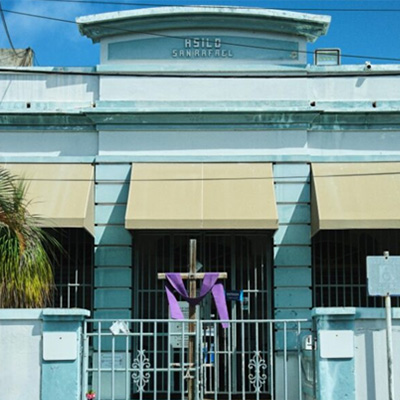
San Rafael Geriatric Center | Diocese of Arecibo, Puerto Rico
For 100 years, Puerto Rico nonprofit has enriched the lives and faith of elderly poor
The San Rafael Geriatric Center is a nonprofit institution operating as a home for the elderly in Arecibo, Puerto Rico. This year the center celebrates 100 years since its foundation and their enduring mission to uplift the elderly poor and affirm their basic human dignity.
Managed by the Daughters of Charity of Saint Vincent de Paul, this dedicated team of four Catholic sisters along with staff and volunteers works tirelessly to bring the mercy of Jesus by providing compassionate care and service to hundreds of elderly. Today, the San Rafael Geriatric Center is one of only two nonprofit facilities in Puerto Rico that provides affordable services to elderly individuals. It has a capacity for 30 residents, who receive shelter, food, medical assistance, occupational and physical therapy, and recreational activities. Services are tailored to meet each resident’s individual needs.
-
Read more
Beyond basic care, the San Rafael Geriatric Center gives its residents a Catholic presence and the opportunity for spiritual growth. The sisters lead daily prayers and offer the Eucharist. They also provide spiritual accompaniment up until the residents’ last moments. There have been residents who, at the threshold of their days, have decided to fully participate in the Catholic faith. Weddings have even been celebrated. Currently, two residents are preparing to receive baptism. Families in Arecibo prefer to take their loved ones to San Rafael because it’s a comforting, faith-centered environment.
Past and present volunteers have said the center left a large imprint on their lives. After working with the sisters, one young woman was so moved by their gentle care for the poor that she discerned a call to join the Daughters of Charity herself.
San Rafael Geriatric Center has been recognized for excellence by the Social Services Department in Puerto Rico and the Rotary Club of Arecibo. Bishop Alberto Figueroa Morales said he is grateful for the center’s dedication to “inspiring hope and igniting change in the residents where their joy of life is preserved while increasing their desire for eternity.”
Even through the island’s devastating natural disasters, the center kept its doors open for residents—many of whom have limited resources, live in poverty or in some cases have no family.
Sister Consuelo, a Daughter of Charity, attributes the center’s centennial success to God: “This is a work of God; this is not of men. We are just instruments for this to happen.” This humble operation sets a wonderful example for the entire community of how to treat the elderly poor with dignity and love in their final chapters of life.
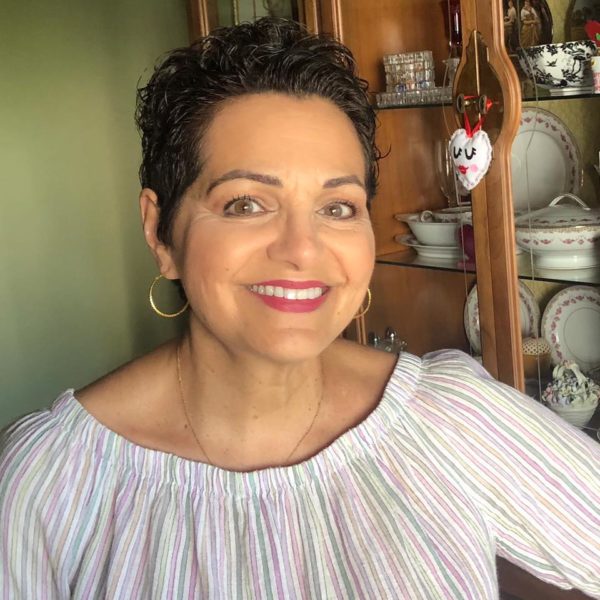
Barbara Shackil | Armenian Eparchy of Our Lady of Nareg
She values young people as the church’s future and ‘present’
For more than six decades, Barbara Shackil has been a devoted member of Sacred Heart Armenian Catholic Church in Little Falls, New Jersey, having served as a catechist, lead singer in the choir and youth ministry director. She was also the Church’s Safe Environment coordinator from 2016 to 2023, helping protect young people. Her commitment springs from a deep belief that children and youth are not only the future of the Church—they are its present, and they must be seen, heard and valued within their faith communities.
To that end, Shackil has been pivotal in fostering engagement and a deeper appreciation for the Catholic faith among young parishioners by helping them recognize their unique spiritual gifts.
She said, “I strongly believe that children and youth have much to offer a parish. Their participation during Mass and at events is imperative to building their commitment and ties to the community. Learning their faith and how to apply it to the community is paramount. … No matter where life takes them, they will always have these memories and sense of value instilled in them.”
-
Read more
This was true in Shackil’s coordinator role with the eparchy. Though she has stepped down, she continues to promote encouraging and safe faith-filled spaces that can serve as a foundation for younger generations to live out their faith authentically.
Her bishop, Mikaël Mouradian, endorsed her as a “faithful and self-sacrificing woman.” All who know Shackil have been touched by this lifelong Catholic’s empowering spirit. Her parish involvements mirror Catholic Extension Society’s investment in the religious education of children and youth, as well as our spiritual and pastoral formation for young adults. She shares our view of the next generation being essential to the vitality of our Church.
Sacred Heart Parish, a strong and active community with a deep religious and cultural heritage, is helping more young people feel at home and grow in their faith. It is through Shackil’s determination that the parish will directly impact 350 parishioners in the coming year.
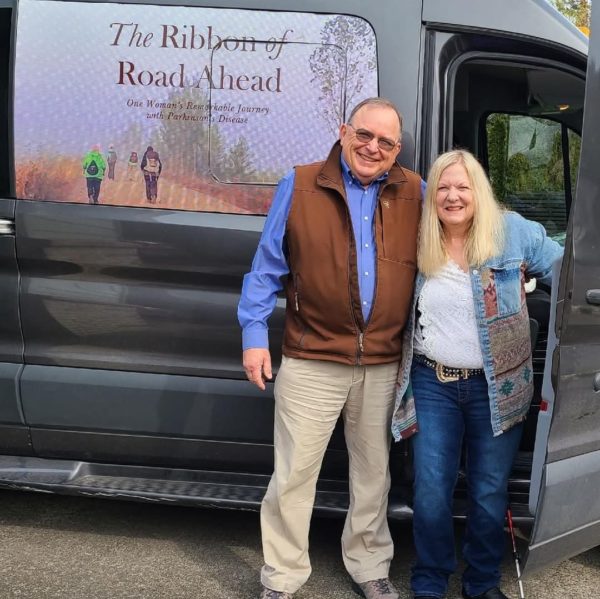
Charlie Clupny | Diocese of Baker, Oregon
Unwavering love anchors a lifetime of service to church and community
For decades, Charlie Clupny has been a pillar of faith and service in the community of Hermiston, Oregon, where he and his wife, Carol, are longtime members of Our Lady of Angels Parish. Supported by Catholic Extension Society since its founding in 1910—including the construction of the church and more recently the development of Hispanic ministry—this parish has been both the center and the beneficiary of Clupny’s extraordinary lay leadership.
A retired speech pathologist, Clupny has used his professional skills to help the Spanish-speaking priest and religious sisters at the parish, strengthening communication and unity within his parish community. Clupny’s ministry touches nearly every aspect of parish life. As an instituted acolyte, he assists regularly at Mass and has played a vital role in faith formation, helping with OCIA and youth ministry programs. He has also volunteered for several years in prison ministry.
-
Read more
Father Daniel Maxwell, pastor of Our Lady of Angels, said, “It would be difficult to try to summarize the extent of Clupny’s ministries in our parish and community. … His cheerful personality and dedication mirror the image of Jesus to those who meet him.”
Beyond the parish, Clupny’s contributions to the broader community are equally impressive. He has served as a volunteer firefighter, as a city council member and on multiple boards. He was state secretary for the Oregon Speech-Language & Hearing Association for 13 years and helped establish a Boy Scout troop at his parish.
Bishop Liam Cary of the Diocese of Baker commended Clupny’s character, stating, “As a man of deep conviction, boundless energy and unparalleled kindness, Charles is the epitome of the values this award seeks to honor.”
Perhaps most inspiring is Clupny’s devotion to his wife, Carol, who was diagnosed with Parkinson’s disease. Together, they have biked long distances to raise awareness, co-authored a book and journeyed internationally to advocate for those living with the illness. Twice, they completed the pilgrimage to Santiago de Compostela.
“The sheer amount of his volunteer work for his parish and community is difficult to comprehend. I don’t have a precise number of those affected by his labors, but they would number in the thousands,” said Father Maxwell. “He has worked with our Anglo and Latino communities with equal devotion.”
Clupny’s life is a powerful testament to faith in action—serving not just within church walls, but throughout his entire community.
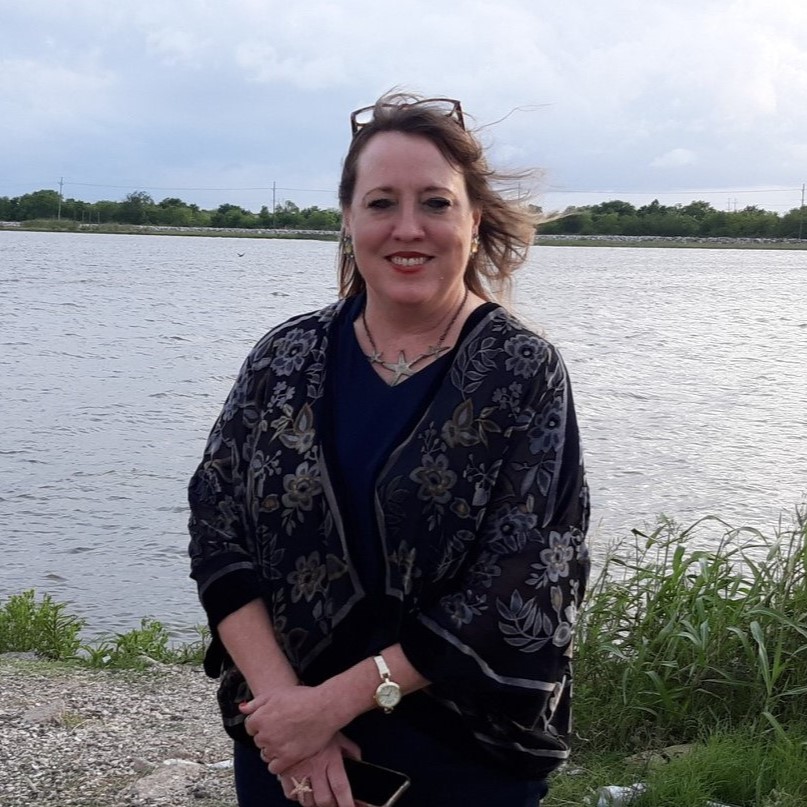
Doreen Badeaux | Diocese of Beaumont, Texas
Her ministry in a commercial shipping port is a light to seafaring crew members
At Port Arthur, the third-largest maritime center in the United States, located 20 miles southeast of Beaumont, Texas, Doreen Badeaux cares for those in the busy yet hidden world that is life as a seafarer. She works with the Stella Maris ministry, whose mission involves bringing the Catholic Church’s pastoral and sacramental life to people of the sea. Thousands of deep-sea vessels enter these local ports, carrying almost 50,000 mariners a year.
Their livelihoods take many of these workers far from home. It is not uncommon for seafarers to experience loneliness, despair and feelings of isolation. That is where those in the Stella Maris ministry, like Badeaux, come in to play a crucial role—greeting these seafarers with kindness and warmth. Badeaux’s greatest impact is measured by the trust she’s earned over 30 years of patient listening and unrelenting care.
-
Read more
In one 2013 instance after Typhoon Haiyan devastated the Philippines, several Filipino mariners found themselves unable to return home and desperate to contact their families. Badeaux stepped in with urgency, advocating to the Philippine Consulate General on their behalf. Though they were thousands of miles from home, these mariners, essentially stranded at Port Arthur, found someone they could turn to in Badeaux. She is a true example of caring for your neighbor.
Badeaux is a trusted confidante. Her work is not driven by recognition, but by deep compassion and a call to serve. She forges strong partnerships with port authorities to ensure that seafarers are protected and empowered.
Retired U.S. Coast Guard Captain Jacqueline M. Twomey said of Badeaux’s ministry, “She tirelessly advocated for the seafarers, including their safety, spiritual care and mental health. Ms. Badeaux devoted thousands of hours in the care of the most vulnerable people in this system—the seafarers performing difficult, dangerous and often stressful work seven days per week, for months on end far away from their homes and loved ones.”
Diocese of Beaumont Bishop David Toups added, “Badeaux’s impacts within this ministry—sometimes intangible and less obvious to those outside the ministry—are boundless and priceless to the people of the sea. Her authentic devotion serves as a beacon of light and a voice of hope and reassurance to the thousands of mariners entering our local ports—a peripheral population often overlooked by the world at large.”
Through the goodness in Badeaux’s heart, seafarers experience accompaniment that is real, personal and faithful. She reminds them that even amid the most isolating journeys at sea, they are seen and valued.
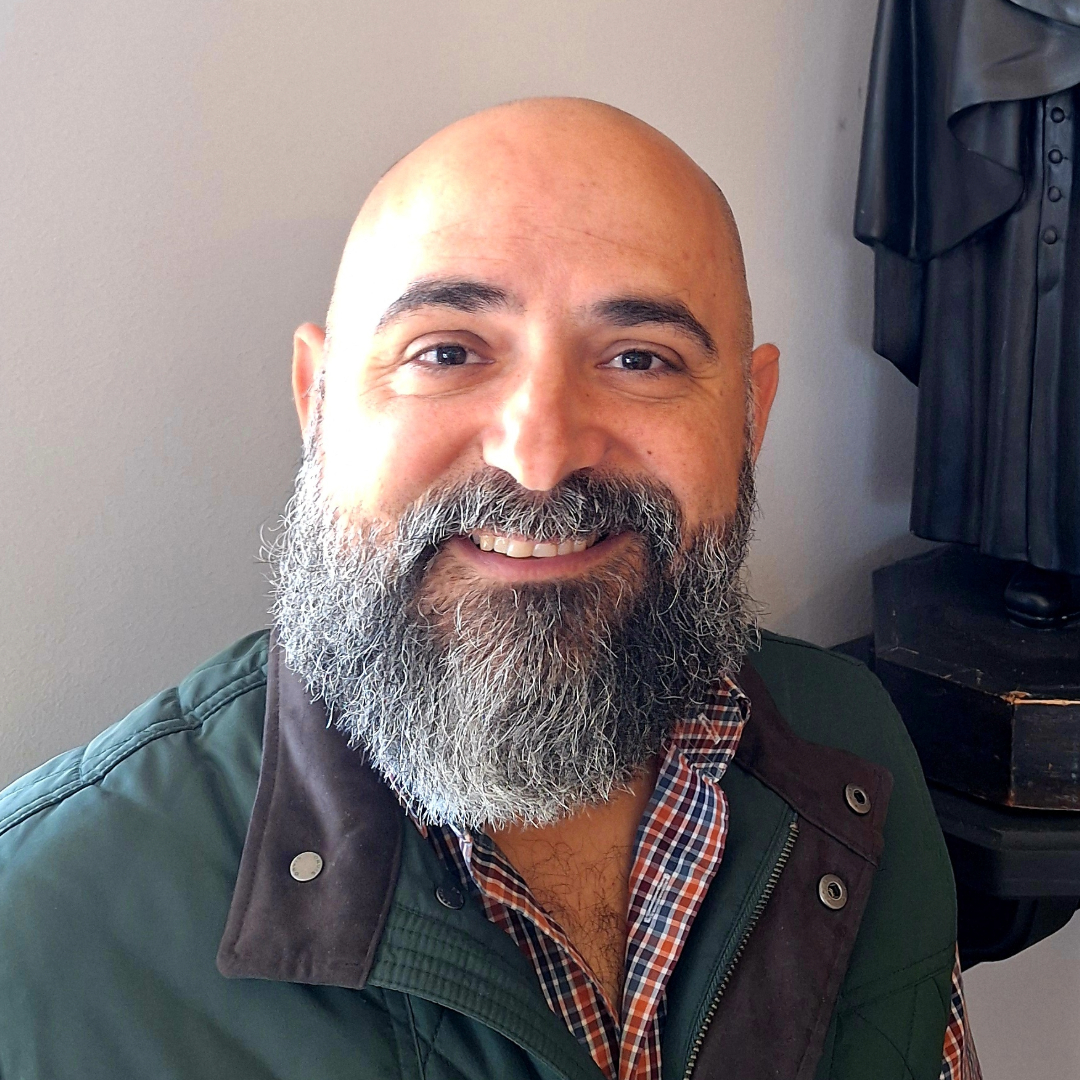
Sam Burke | Diocese of Biloxi, Mississippi
Mississippi man runs charitable pharmacy that has far-reaching healthcare impact
Sam Burke is a lifelong member of Nativity of the Blessed Virgin Mary Parish in the Diocese of Biloxi. He has a passion for nonprofit work. As executive director since 2011of St. Vincent de Paul Community Pharmacy (SVDPRX), based in southern Mississippi, he has helped the pharmacy grow into a trusted source of hope for hundreds of uninsured and underinsured individuals. Building on the foundation laid by Theresa Pavlov—one of the pharmacy’s founders and a 2013 Lumen Christi Award nominee—Burke has significantly increased access to affordable health care in the diocese’s most far-reaching areas.
What began in 1998 as a small operation filling medicine from a closet has become a multi-facility service that fills over 30,000 lifesaving prescription medications annually for free or at low cost across the diocese—$1 million worth of medicine! These feats are possible because Burke and his 60-plus volunteers embody charity, solidarity and compassion toward those in need.
With locations in Biloxi and Hattiesburg, SVDPRX continues to expand its services. When Father Tommy Conway, pastor of St. Fabian Parish in Hattiesburg, approached Burke about opening a pharmacy site in the Pine Belt region, Burke acted swiftly. That pharmacy has since become a lifeline in the local community.
-
Read more
A milestone for SVDPRX came in 2017 when a former storage space in Hattiesburg was converted into a fully functional pharmacy through a cross-denominational volunteer effort. Homeless individuals, those living in group homes, those considered to be the “working poor” and those recently released from incarceration are among the vulnerable populations who have benefited from this outpost of hope.
“It was a work of love,” said Robert Donnell, a volunteer pharmacist at the Hattiesburg location.
Bishop Louis F. Kihneman III attested to this: “[Burke’s] collaboration with volunteers and community organizations exemplifies the spirit of cooperation that makes his mission so successful.”
Burke empowers his volunteers daily in the mission toward equitable health care. Burke and his volunteers carry these words from St. Vincent de Paul in their hearts: “Judge persons and things in the most favorable light.” Their compassionate care goes beyond medicine—they ensure whole communities, even the most marginalized ones, can thrive.
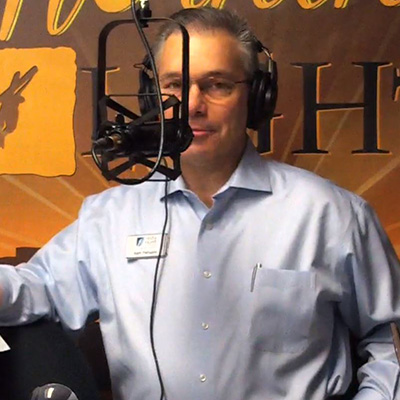
Keith Pettyjohn | Diocese of Boise, Idaho
The Gospel reaches into hearts and homes through airwaves
Keith Pettyjohn is the founder and president of Salt & Light Radio, a Catholic radio network serving the Diocese of Boise. With four stations—two English and two Spanish—Salt & Light now reaches more than 140,000 people across Idaho. A humble and faith-filled steward, Pettyjohn first encountered Catholic radio while on a business trip to his hometown of Walla Walla, Washington, in 2007. Deeply moved by the impact such programming had in his home state, he returned to Idaho and began working to establish Catholic radio in the region.
Despite the economic challenges of the Great Recession, Pettyjohn and his team spent two years raising the necessary funds to acquire their first two AM stations, launching broadcasts in Boise and Caldwell in 2009. Today, the network has expanded to include stations in Twin Falls and several FM translators, making Catholic content accessible to an ever-growing audience, particularly Idaho’s significant Hispanic population.
“Led by Keith Pettyjohn, Salt & Light Radio has had a tremendous impact on Catholics and non-Catholics alike in the Idaho community,” said Bishop Peter Christensen.
-
Read more
Salt & Light Radio is sustained almost entirely by volunteers and listener support. Bishop Christensen has praised the ministry for its profound outreach, particularly among underserved communities.
The mission of the radio network is “to evangelize and teach, through multi-media communications, the Gospel of Jesus Christ, with the fullness of Truth of the Catholic Church. We strive to be Salt & Light (Mt. 5:13-16) to all: to promote and build up Christ’s body, the Church.”
Salt & Light offers a blend of global Catholic content through EWTN and locally produced programs featuring diocesan clergy and lay leaders. It covers special Masses and local high school sports and hosts numerous events—such as men’s and women’s conferences, a vocations golf scramble, and a family day promoting literacy that serves up to 2,000 Hispanic participants.
Pettyjohn’s dedication has extended the reach of the Church far beyond traditional parish walls—into prisons, rural homes and the hearts of the isolated. Listeners frequently credit the station for renewing or even sparking their faith. One prisoner wrote, “I long to be holy … thank you!” Another listener said, “After listening to Salt & Light, I have a better understanding of my Catholic faith. Now when I receive the Holy Eucharist, I truly feel the presence of Christ.”
Under Pettyjohn’s leadership, Salt & Light Radio continues to be a beacon of faith, hope and unity across Idaho.
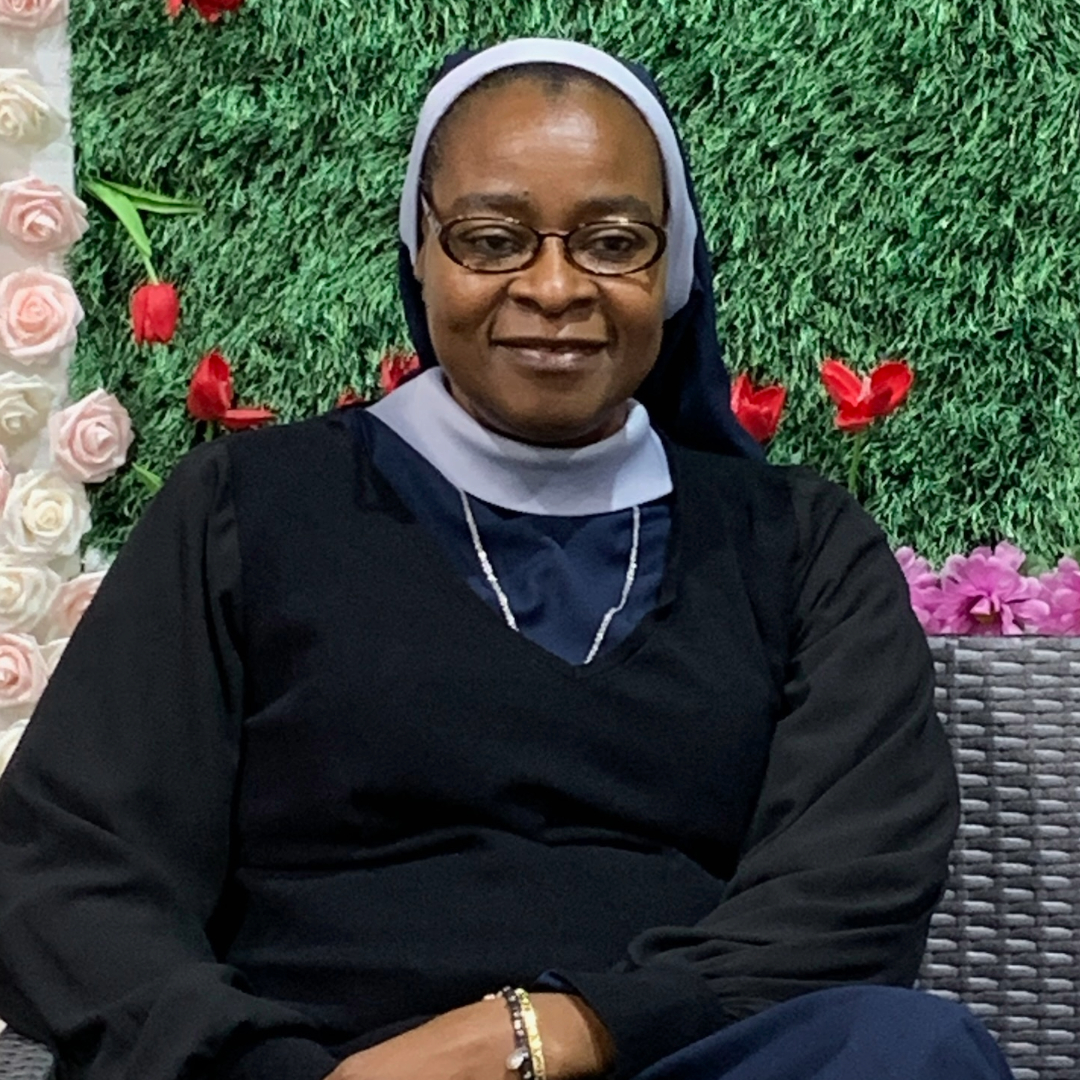
Sister Stella Mary Okogie | Diocese of Charleston, South Carolina
She’s the first friendly face mothers in crisis see
Originally from Nigeria and a member of the Sisters of St. Michael the Archangel, Sister Stella Mary Okogie draws on more than 35 years of nursing experience to serve mothers and children at St. Clare’s Home in both Greenville and Charleston, South Carolina.
These homes were created to support mothers facing crisis pregnancies. Many of the women who enter have not held basic responsibilities—including completing household chores and cooking meals for themselves—for several years. Often the women are homeless or coming to St. Clare’s Home from abusive situations. When they arrive, Sister Stella Mary is often the first friendly face they see, and her gentle presence makes the home a place of healing and formation, a doorway to new beginnings for these women.
Along with nursing, some of the many ways Sister Stella Mary leads day to day include cooking meals, organizing groceries and helping mothers gain a better understanding of how to care for their child after they leave St. Clare’s Home.
Most notably, she helps these women feel assured of their human dignity again.
-
Read more
One mother shared, “I was homeless and pregnant before arriving at St. Clare’s Home. I was out of tune with a regular day that was full of responsibilities. Sister Stella Mary retaught me how to be clean, respectful, humble and responsible. She’s not just someone who impacted my life—she’s one of my heroes.”
It is a ministry of the moment— Sister Stella Mary meets women in difficult circumstances where they are and offers not just shelter, but hope. Her presence reminds them that they are not forgotten and that the Church is with them.
Colleen Chmiel, a volunteer coordinator, summarized the simple yet profound impact of Sister Stella Mary’s presence: “When Sister Stella Mary greets residents, family members of residents, coworkers, volunteers and donors she always says, ‘You are welcome,’ and isn’t that the way we all want to feel?”
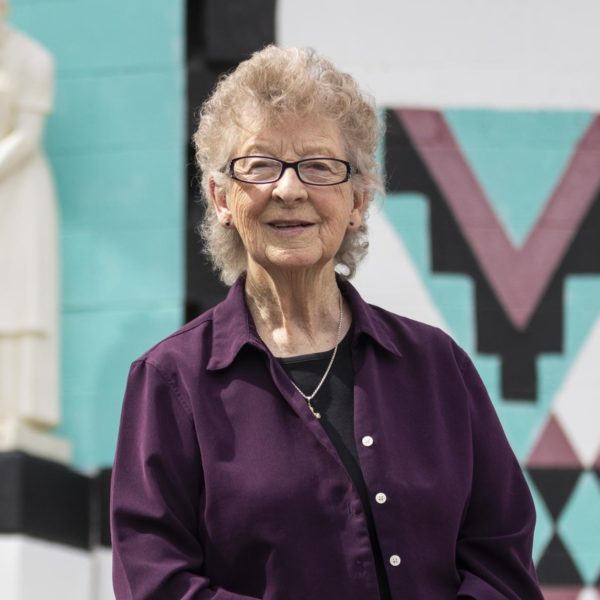
Sister Teresa Frawley, OSF | Diocese of Cheyenne, Wyoming
The ‘Eagle Wing Woman’ from West Ireland
Sister Teresa Frawley, OSF, hails from County Clare in the west of Ireland. Today, the Irish-born nun is the “Eagle Wing Woman” on the Wind River Reservation in Wyoming, home to the Shoshone and Arapaho people.
Her remarkable vocational journey as missionary began decades ago, when the Sisters of St. Francis of Philadelphia, who ran a hospital in Ireland, came to talk to her high school. Inspired by her mother’s deep devotion to St. Francis and a desire to live a life in service to the poor, she joined the sisters and their mission. In a magazine, she saw the faces of the hungry and impoverished in America and felt called to serve in a new country. She has now spent over 40 years in Wyoming, offering the Church’s presence to the Native American communities she serves.
“What we need most is to know that you care about us,” the Native elders told her when she arrived. She said the advice “seemed so simple and yet so complicated in some ways and so much work. But I thought that’s what I’d really like to do—walk among the people and be with them.”
-
Read more
It’s when families are grieving that Sister Teresa’s presence has been perhaps most appreciated and welcomed. She has developed a deep understanding and appreciation for the cultural and spiritual aspects unique to the Arapaho and Shoshone people, leading to her development of a funeral vigil prayer that incorporates drumming and hair-cutting bereavement ceremonies that are so important to the people.
She has become like family to many in this community, which is why after many years on the reservation she was given the great honor of the name “Eagle Wing Woman.” The eagle is revered in Native communities because it is the creature that flies the highest and is closest to the creator. An eagle wing is typically used to bless people with cedar incense during prayer.
Sister Teresa explained, “[The Shoshone elder] said that she gave me that name because I bring blessing to the home and bring prayer. It was quite an honor, and I do appreciate it. It kind of took my breath away.”
Sister Teresa has faced the demanding physical challenge of living alone in the harsh and rugged environment of Wyoming. Winter temperatures of 50 below and July temperatures of 105 degrees have strengthened her so that shoveling snow, repairing frozen pipes and installing evaporative swamp coolers are no problem for her at the three parishes she serves.
Sister Teresa has a toughness and a stick-to-itiveness just like the Native people she serves. That determination mixed with her gentle compassion is why she’s been not only accepted—but is now the “Eagle Wing Woman.”
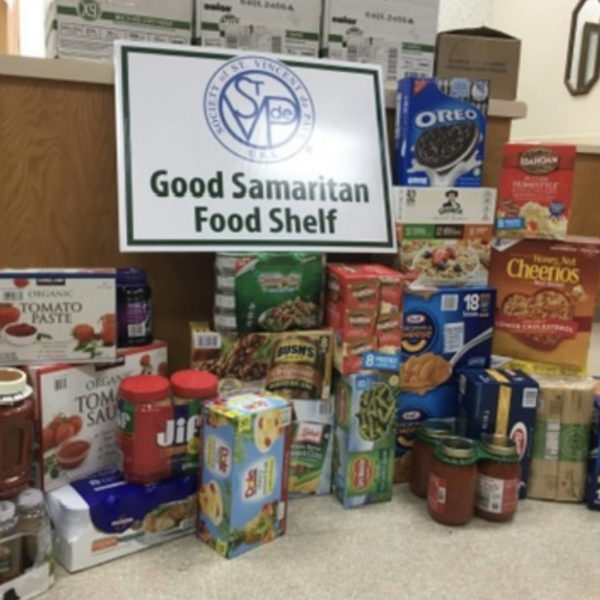
Nancy Crompton | Diocese of Crookston, Minnesota
Minnesota farmer puts food on the table in six rural towns
Nancy Crompton is a mother of five, a catechist and one of the parishioners at the heart of St. William’s Catholic Church in Twin Valley—a church Catholic Extension Society helped build 70 years ago. She spends her days farming with her husband and children. And for her parish, she’s sowing seeds of kindness that quietly transform her faith community.
Since 2015, Crompton has served as the coordinator of the St. Vincent de Paul Good Samaritan Food Shelf. What began as a modest pantry has become a vital lifeline for six small towns. Grocery stores can be an hour’s drive away from these rural communities. Crompton ensures that more than 250 families a month receive nutritious food through mobile drops and pantry visits. But her work doesn’t stop at the shelves. She’s assisted families with making rent payments, purchasing items for infants and finding furniture.
-
Read more
She is a constant presence at her parish, showing up at funerals with warm food, cooking brunch after weekend Mass and bringing meals to the sick and homebound. In between, Crompton runs her own embroidery business, though many of her creations are quietly donated to schools, churches and fundraisers throughout the region. “This is what God needs me to do,” she said, simply.
Through mobile food drops, warm meals and welcome invitations to the parish, Crompton gently draws people closer to each other. Cross ornaments and prayer cards tucked into Easter baskets. A ride, a bouquet of flowers, a phone call. These are the marks of her ministry.
She does it all with friendship in her heart. One neighbor recalled, “As soon as I met Nancy, I knew I had found a dear friend.” It’s this sense of belonging that turns pantry visitors into volunteers, and strangers into community.
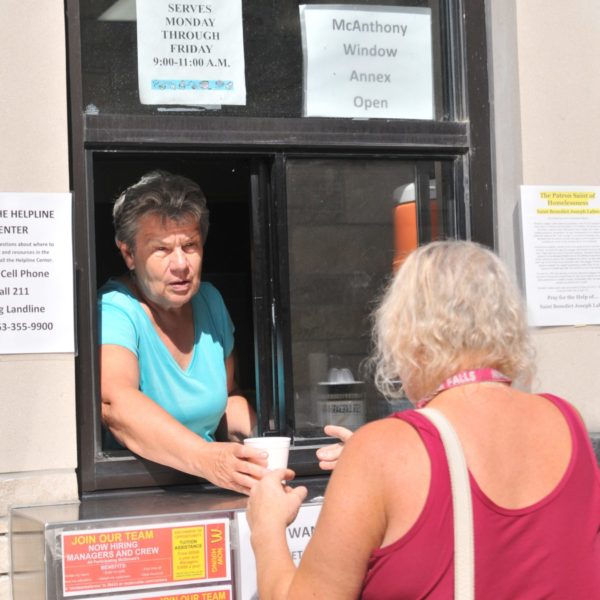
McAnthony Window | Diocese of Davenport, Iowa
Serving more than just meals, they give the ‘down and out’ newfound purpose
Across nearly four decades in downtown Davenport, Iowa, McAnthony Window, an outreach of St. Anthony’s Catholic Church, has offered thousands of hot meals to those in need. It began simply in 1987, when a sliding window—fashioned by the parish maintenance man—was cut into the rectory wall to hand out hot meals, mimicking the convenience and efficiency of a fast-food delivery window. That small act of ingenuity has since grown into the largest parish-run outreach in the Diocese of Davenport.
Each morning, volunteers from all walks of life gather to serve their neighbors in need. Now offered at St. Anthony’s parish hall, McAnthony Window served more than 33,000 hot meals last year alone. But the fresh meal is just the start. This window of welcome has also provided resources from bus tokens, winter coats and hygiene kits to AA meetings and personal finance classes. McAnthony Window’s annual impact touches the lives of 80,000 people.
-
Read more
Behind that impressive number are the names—Lawrence, who used bus tokens to attend job coaching classes; Terry, once unhoused, who now rents an apartment after completing personal finance courses; Aundre, who, through the Building Conscientiousness for Life and Work class, discovered a book that helped him “rethink” his actions.
Today, McAnthony Window isn’t just handing out food—it’s handing out a sense of purpose. It’s an open window for those who have felt shut out. As John Cooper, parish business manager, put it, “The call from Jesus is to always look for ways to do more. We are reminded of this every day when we see the face of Jesus in our parishioners and patrons.”
From a single sandwich and cup of coffee to a full-fledged community center, McAnthony Window stands as a place of welcome and empowerment. It’s a simple way in which the Church demonstrates some of Her most profound efforts as a place of welcome and one that truly cares for the well-being of each person.
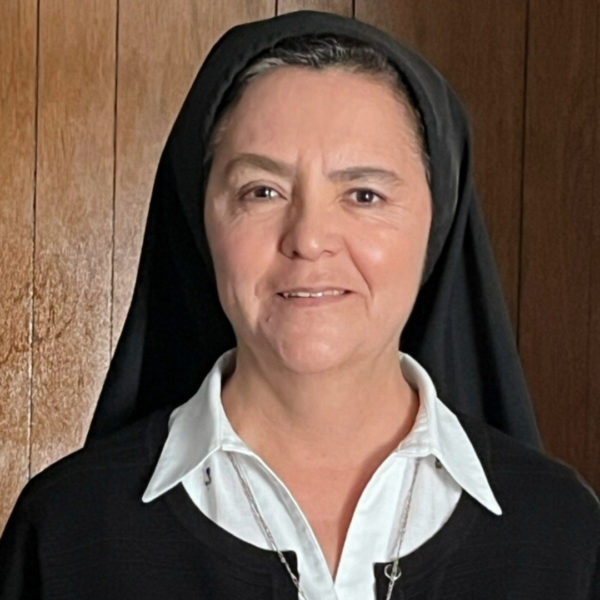
Sister Petra Palau Oviendo | Diocese of Dodge City, Kansas
Religious sister in Kansas shows us what a modern-day missionary looks like
A sister of the Mexico-based Missionaries of the Charity of Mary Immaculate (MCMI), Sister Petra Palau Oviedo arrived in the Diocese of Dodge City, Kansas, in May 2023. The MCMI sisters—who have been in Kansas since 2002—relocated to the eastern part of the diocese in recent years to serve growing Hispanic communities, where there is no Mass offered in Spanish and many families were connected to their parishes only through their children’s sacramental preparation.
Sister Petra arrived in the United States with a wealth of experience—degrees in sacred scripture and psychology from the University del Valle of Mexico, not to mention 40 years as a Catholic sister building up faith communities. Despite finding herself in an entirely new country, she did what she knew to be effective in engaging and inviting people into parish community: simply meeting them where they’re at.
-
Read more
Sister Petra goes out to five distinct communities within her parish and stays with each for a week at a time. Since starting these visits, Sister Petra has helped the families she serves grow in their faith. Whether it’s programming Bible studies, sharing reflections on the sacraments or simply teaching people how to pray, Sister Petra is inviting all to encounter God each day. Sister Petra is truly going out and extending the embrace of the Church to those longing to be recognized.
One parishioner, Alondra, said of her relationship with Sister Petra, “She asked if I could help with the readings during Mass. I was initially very afraid, but she consistently encouraged me, and her words made me feel confident that I could succeed. Now, I read with pleasure and am grateful to her for trusting me. I feel fortunate to have Sister Petra in my life because she has integrated me into the community. It has been a tremendous blessing to believe again, have faith and, above all, find the motivation to keep getting closer to God.”
“As I support them through their struggles, I find strength and hope in our mission to proclaim the Gospel in a changing society,” Sister Petra said of the communities she serves.
The people have grown to simply love her presence as she walks around town and comes to visit. Even the parishioners who do not speak Spanish have commented that having a religious sister in the community is a great witness to the faith.
Sister Petra’s work will touch thousands as she continues on during her time in Kansas. She is fulfilling the example of our new shepherd, Pope Leo XIV, who lived a missionary life in another country. Sister Petra embodies a true missionary spirit, entering homes, communities and parishes to share her joy for our Catholic faith.
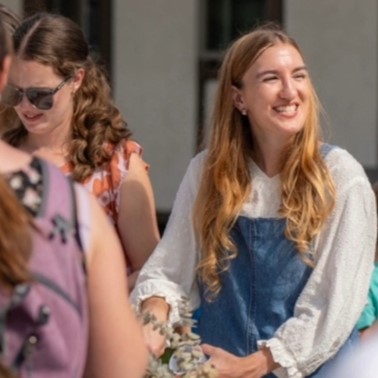
Bethany House | Diocese of Duluth, Minnesota
Meet the young women transforming the church in northern Minnesota
Founded in 2023, Bethany House in Virginia, Minnesota, is a growing community of young women committed to living lives of deep prayer, service, formation and joyful missionary presence. The women living in this house are active within the community—some are working as teachers at the local Marquette Catholic School. Naomi Ringhand, who initially founded Bethany House, is a youth minister at the school’s church, Holy Spirit Parish, and at three additional missions in the area.
The sixth of 10 children and a Minnesota native herself, Ringhand leads Bethany House with a clear and compelling vision: to be a home where young adult women are formed spiritually and go out in service to enliven faith in their community. A typical day at Bethany House begins with morning prayer, followed by work and various evening commitments centered on community life at the house and parish.
It’s a mission that is growing. In just 18 months, Bethany has grown from one house to two, with potentially two more on the horizon. Diocese of Duluth Bishop Daniel Felton praises the up-and-coming Bethany House for its emphasis on values of unity and service.
-
Read more
“The women live community life together and grow in the gifts God has given them for the world through a variety of missional opportunities,” said Bishop Felton. “These women truly radiate and reveal the light of Christ present in the community where they serve.”
One local priest described Bethany House as “a well of grace that will bless our community for generations.” This is indeed a special place rooted in joy. A group of leaders coming together yearning for a deeper commitment to service and faith. They’re on the precipice of building an even larger community. With big plans and Ringhand’s determined leadership, Bethany House can have a transformative impact in Northern Minnesota for years to come.
Regardless of what God ultimately calls these women to do, they can rest assured that their coming together as an intentional community, in order to support one another in ministry, is having an impact on other young people right now.
Ringhand said of youth ministry, “I love it. A lot of my ministry is in the school. I think it’s really delightful and our kids are amazing. Our last night of faith formation is always kind of emotional walking with them for a year and now watching them move into something new.”

Monsignor Arturo Bañuelas | Diocese of El Paso, Texas
The pastor who inspired 72,000 lay leaders
“Boanerges, the Sons of Thunder” is a nickname given by Jesus to James and John, the sons of Zebedee (Mark 3:17). The name is believed to be a reference to their fiery temperaments. Coming from Jesus, this nickname would be a high compliment.
It is not a stretch to imagine Jesus giving that same nickname to Monsignor Arturo Bañuelas. The monsignor has been a true bolt of energy to the Diocese of El Paso and the Catholic Church in America.
Monsignor Bañuelas is a native of El Paso, Texas. After earning his doctorate from the Gregorian University in Rome in 1988, he went on a discernment retreat at the Basilica de Guadalupe in Mexico City. On the last day of this retreat, standing in the place where the Blessed Mother gave Juan Diego the roses, he too had a vision. He felt inspired to create a lay ministry formation program in the diocese to help build the Church.
At that time there was little ministry education available to lay leaders and volunteers. Twelve hundred people participated in the first classes offered—an overwhelming response that confirmed the monsignor’s vision.
-
Read more
The Tepeyac Institute was then born. Its mission was to assist the laity in taking their rightful role in the life and mission of the Church. Monsignor Bañuelas was clear: The formation programs were not founded as a response to the shortage of priests. They were founded on the inspiration of Vatican II and the council’s call for the laity to assume a mature and responsible response to its baptismal vocation.
Over the next 37 years, the Institute’s impact was nothing short of “thunderous.” Since its inception, 72,000 people have participated in the Tepeyac Institute’s formation programs. Practically every parish in West Texas has lay ministers that have been trained by Tepeyac.
There is training for ministers of communion, lectors, catechists, marriage and baptism preparation, RCIA, music ministry, quinceañera preparation and prison visitation ministries, to name a few. All classes are offered in English, Spanish and sign language when needed. Catholic Extension Society has provided continual support to make these formation experiences open to all.
The course offerings rival those offered by top-notch Catholic universities. Theology, morality, spirituality, social justice, liturgy, scripture, church history and youth ministry are just some of the offerings. Scholars from the University of Notre Dame, Boston College, Santa Clara University, Berkeley and Catholic Theological Union are among the presenters. Participants can earn up to a master’s degree in theology.
Monsignor Bañuelas expanded formation initiatives beyond the Diocese of El Paso. He is a co-founder of the Academy of Catholic Hispanic Theologians of the United States (ACHTUS) and most recently established the Hope Border Institute, which focuses on justice issues in the three border dioceses of El Paso, Texas; Las Cruces, New Mexico; and Juarez, Mexico.
What is remarkable is that the Tepeyac Institute was never even the monsignor’s day job. Most recently, he served as pastor to two of El Paso’s largest parishes, St. Pius X and St. Mark the Evangelist. Seventy-two hundred people attended Mass at St. Mark’s every weekend.
Many adjectives can be used to describe Monsignor Arturo Bañuelas. Fiery, visionary and passionate are just a few. Add to that list: a Son of Thunder. James, John, Jesus and the people of El Paso would wholeheartedly agree.
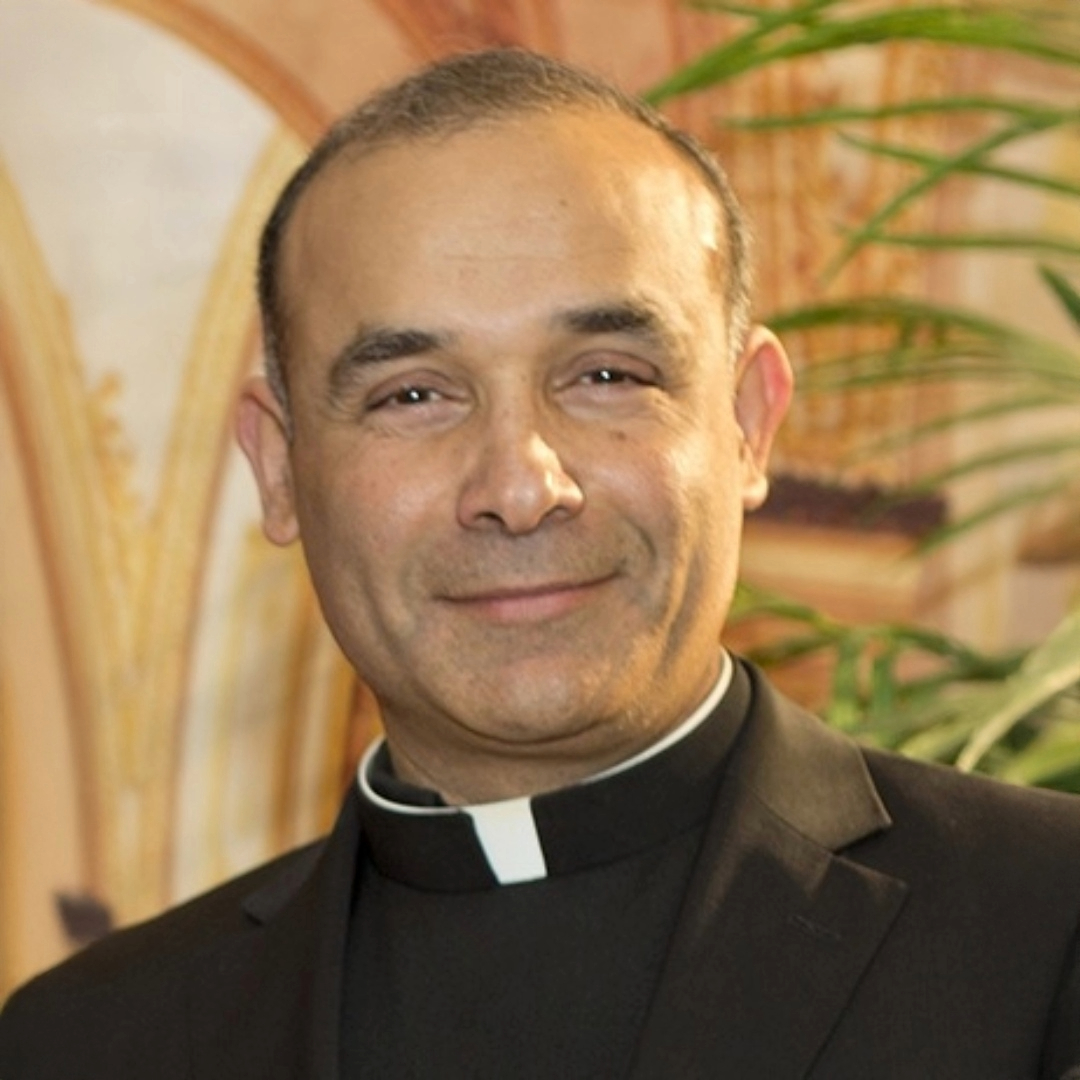
Monsignor John Nahal | Eparchy of Our Lady of Lebanon
Lebanese American priest is a war survivor who helps victims of conflict
In the First Letter to the Corinthians, St. Paul writes, “The word of the cross is folly to those who are perishing, but to those who are being saved it is the power of God.”
It is a hard teaching to grasp. Can the cross, and all of our crosses, have the power to save? Can God’s powerful love come from places of suffering? We need examples to help us grasp the depth of this truth. Monsignor John Nahal is just such an example.
The monsignor was born in Lebanon. He spent his childhood in a little town where, from 1975 to 1990, he and his family suffered from the violence and inhumanity of the Lebanese civil war. That war’s chaos planted seeds of hope in Nahal’s heart.
He entered the seminary in Lebanon in 1987 and was ordained a priest in 1993. After serving his first two years as director of a Catholic school in southern Lebanon, he was sent to the US in 1995. He has now served for 30 years as a priest in the Maronite Catholic Eparchy of Our Lady of Lebanon, a Catholic Eastern Rite community supported by Catholic Extension Society.
-
Read more
Monsignor Nahal began his ministry as president of the organization Caritas Lebanon USA in 2018. Caritas Lebanon has been of vital importance in assisting the poorest of the poor, especially since 2019 when Lebanon experienced the fall of its government, devaluation of its currency, the COVID-19 pandemic, a massive explosion in the port of Beirut that rocked the entire city, and wider regional wars in the Middle East that have resulted in hundreds of thousands of refugees pouring into Lebanon.
Throughout all of this, Caritas Lebanon has helped our Lebanese brothers and sisters who are suffering from poverty, sickness and violence.
Monsignor Nahal’s ministry at Caritas Lebanon USA is founded on the words of Jesus: “I was hungry, and you gave me food.” He challenges his people to give to the less fortunate without any discrimination or judgment. His gentle, easygoing nature and his kind smile help people understand how God is active in their lives and inspire them to give as God would have them give.
Monsignor Nahal believes in the providence of God: “Ask and you shall receive …” When a family in Lebanon had nothing to eat, contributions from the US always came at the right time.
Some people think the cross is folly. Monsignor Nahal knows better. His life is an example of how the saving power of God’s love comes from suffering and how our Good Fridays lead to Easter.
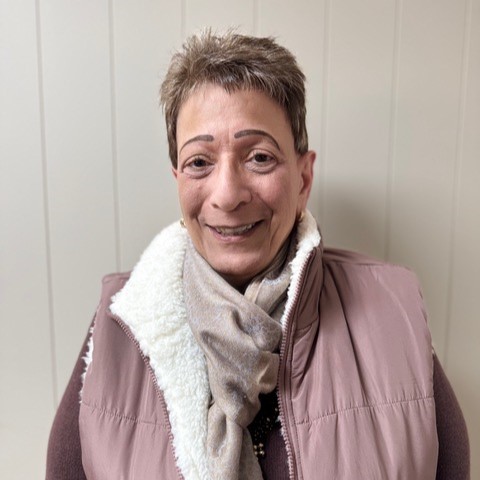
Paula F. Samia | Eparchy of St. Maron of Brooklyn
‘More than just a job’: The behind-the-scenes backbone of a parish
For over four decades, Paula F. Samia has been the backbone of the parish offices at St. Theresa Maronite Catholic Parish in Brockton, Massachusetts. The secretary and office administrator since 1983, Samia has been a constant, supporting nine different pastors in her time. Her efforts have helped keep St. Theresa’s functioning through pastoral transitions and economic hardships. As the parish puts it, her presence as St. Theresa’s has been “indispensable.”
Bishop Gregory John Mansour of the Eparchy of St. Maron of Brooklyn said, “Paula’s ministry for the Church is often overlooked. Her hard work and dedication have kept the parish alive despite all of the challenges the community has faced. She is a pillar of the community.”
-
Read more
Not only has Samia been keeping the parish organized at an administrative level, but she has also taught generations of children as a catechist and youth leader. Many of the children she taught are now serving as leaders at the parish and in the wider community. She’s seen these parishioners baptized into the faith and has served them as they prepare for marriage.
Many in the community fondly think of Samia at Christmas for her efforts building the parish’s Nativity scene. This past year, the church had no heat for several weeks leading up to the Christmas season. But that didn’t stop Samia from bundling up to get the Nativity scene ready for a faith community she cares about deeply. The community has joy and pride in seeing the work she puts in to make their church a beautiful, sacred place for worship.
“I find joy in knowing that I am part of a larger effort to serve and support the spiritual well-being of our parish community,” Samia said. “On a personal level, working at the church has been an incredibly fulfilling journey of growth and purpose. I feel honored to play a small role in the broader mission of the Church. This work is more than just a job; it is a calling that has enriched my life, provided me with a sense of purpose and connected me to my community that I deeply cherish.”
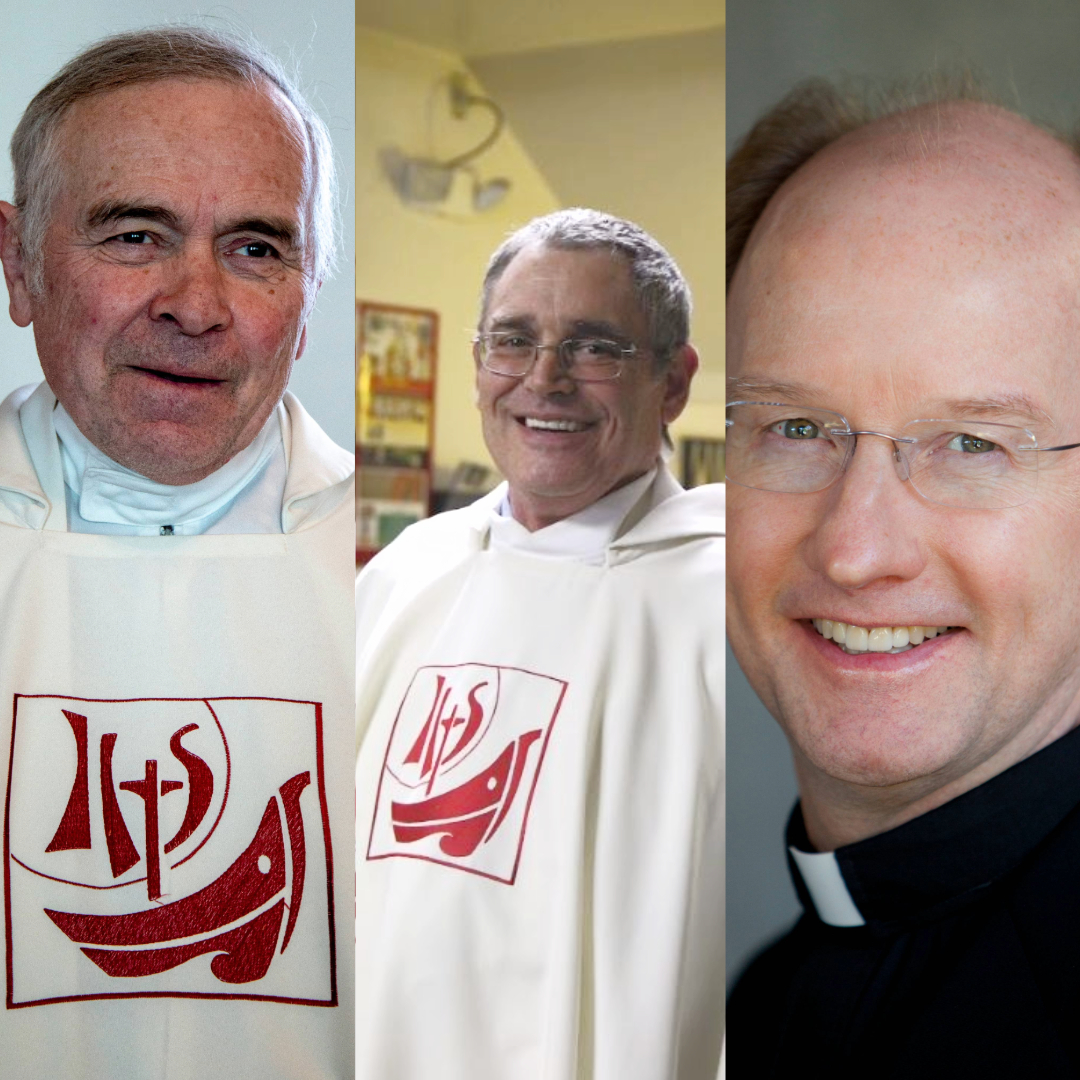
Jesuits of Northern Alaska | Diocese of Fairbanks, Alaska
Equipping Native faithful to lead in extremely remote villages
Three Jesuit priests—Father Thomas (Tom) Provinsal, Father Gregg Wood and Father Rich Magner—have offered nearly a century of combined service to Native Alaskan Catholic communities.
The three priests together serve about 8,000 people throughout the entire Yukon-Kuskokwim Delta region—not through only their pastoral care, but through their training, encouragement and solidarity with Native Catholic leaders. This area is about the size of Louisiana and contains 24 of the diocese’s 46 parishes. What’s more, few villages are connected by road systems, and most can be reached only by air or water. Catholic Extension Society supports operational expenses for parishes as well as the priests’ travel costs.
Father Tom Provinsal has spent nearly his entire 50-year priesthood in Alaska. He faithfully ministered to Yup’ik Catholics in Bering Sea villages for most of that period, and his ministry today involves traveling between three extremely isolated villages to provide spiritual care and nurture local vocations.
-
Read more
Father Gregg Wood has served for nearly 30 years in rural Alaskan villages. As the director of the diocese’s Native Deacon Program, Father Wood recruits, forms and supports Indigenous deacons.
Father Rich Magner, during his Jesuit formation, spent time ministering in western Alaska and developed a deep love for the Yup’ik people. Ordained in 2012, he returned to Alaska eight years ago and ministers among three Indigenous coastal communities.
Under the guidance of the Jesuit priests, parishes throughout the Yukon-Kuskokwim Delta region are able to live out their Catholic faith in and through their cultural heritage. In many villages, prayers and hymns are celebrated in Yup’ik, and the Mass incorporates Yup’ik values and traditions such as drumming and communal leadership.
The Jesuits rotate among these remote parishes, striving to visit each community at least once a month. However, the diocese’s shortage of priests combined with the remoteness of parishes, extreme weather conditions and lack of modern amenities like plumbing make it challenging to provide more consistent pastoral care.
Recognizing these obstacles and desiring to foster a truly Indigenous Church, the Jesuits have a long legacy of empowering lay ministers and rural deacons to help administer their parishes in the absence of clergy. The priests provide training and encouragement through the Native Deacon Program, the Native Ministry Training Program, the Adult Faith Formation Program and the Intercultural Dialogue Group. Catholic Extension Society supports these training programs. These formation programs reflect the needs of the people. For example, workshops and retreats for deacons are scheduled around their subsistence lifestyle activities, such as hunting and fishing, to ensure that men can provide for their families while serving the Church.
“Under the leadership of these Jesuit priests, parishes throughout the Yukon-Kuskokwim Delta have taken significant steps toward a truly universal Church,” said Bishop Steven Maekawa of the Diocese of Fairbanks. “The Jesuits’ cultural sensitivity, humility and unwavering commitment to the spiritual and cultural well-being of Alaska Natives has left an indelible impact on the Church in northern Alaska.”
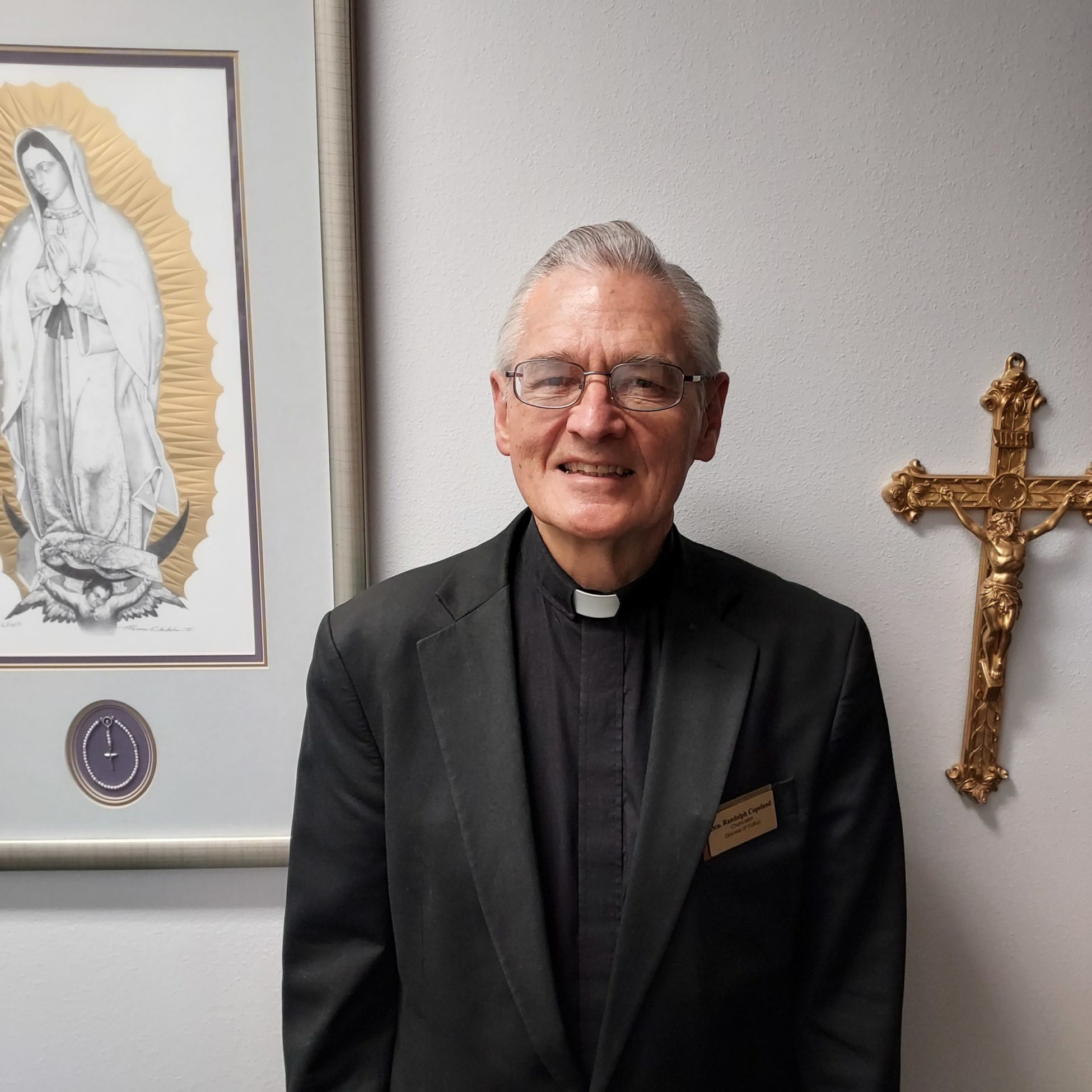
Deacon Randolph Copeland | Diocese of Gallup, New Mexico
This deacon’s job description is as big as the 55,000 square miles he serves
To say that Deacon Randolph Copeland wears many hats would be a world-class understatement. It would take 100 milliners to supply all the hats he is called to wear.
Deacon Copeland serves in the Diocese of Gallup, New Mexico—and Gallup is big. It covers 55,000 square miles, two states and two time zones, and Deacon Copeland is chancellor of every square inch.
Gallup has many challenges. Twenty-five percent of its population lives at or below the poverty line. Its per capita income is half that of the nation’s. Seventy-four percent of its population is Native American, most of whom face enormous health and economic challenges. And with poverty comes crime. Gallup’s crime rate is 173% of the national average.
It is in the heart of such challenging circumstances that the Catholic church is at its best. And it is Deacon Copeland who personifies our church’s mission.
-
Read more
Deacon Copeland’s duties as chancellor include personnel and property management—no small task. There are 53 parishes and over 50 priests in his portfolio. Deacon Copeland coordinates mission outreach for solicitation of funds and coordination of special projects as directed by Bishop James Wall.
Deacon Copeland is also called upon to help with more mundane matters—like fixing a roof that caved in on a church after violent storms or fixing a leak in Bishop Wall’s office. Deacon’s to-do list is never-ending.
And how does Deacon Copeland manage so many things so well? The answer can be found in a quote from St. Therese of Lisieux he has pinned to his office wall: “Let us humbly take our place with the imperfect.” He is lifted up and energized by God who always stands with those who have been counted out.
When he retired in 2001, he and his wife moved to Gallup, New Mexico, to work in the Orthopedic Surgery Department at Gallup Indian Medical Center, which is dedicated to the service of Native American peoples of that region with a special focus on children.
It is the children who are Deacon Copeland’s North Star. He and his wife are deeply involved in local pro-life efforts to support young families and mothers in crisis pregnancies.
Those who know him best say that Deacon Copeland always helps individuals in need. He does this as a matter of habit. The bishop himself says that this “is most inspiring and very true. In Deacon’s life he does much that is seen but also unseen.”
The truth is that Deacon Copeland serves the distressed, no matter who they are and in whatever capacity they need.
And that, perhaps, is the best job description of any deacon, including this dedicated servant who stands with those who have been counted out.
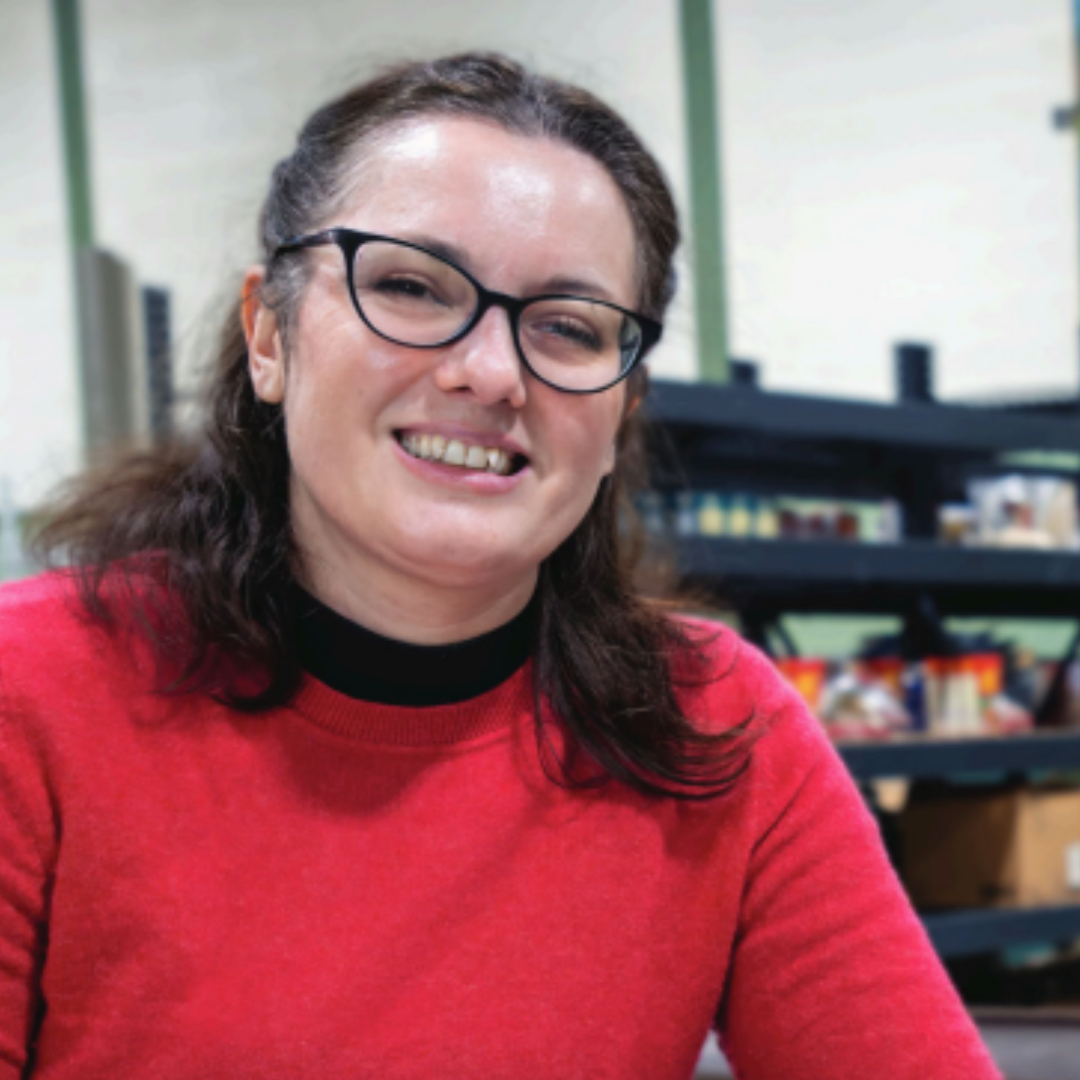
Christina Kihn | Diocese of Gaylord, Michigan
She was once homeless, and now she’s a guiding light to those still struggling
“For I was hungry and you gave me something to eat, I was thirsty and you gave me something to drink, I was a stranger and you invited me in, I needed clothes and you clothed me, I was sick and you looked after me, I was in prison and you came to visit me.” (Matthew 25:35-36)
These words are more than scripture for Christina Kihn, director of the Center of Charity at All Saints Parish in Michigan’s Alpena community—they are her life’s mission. Through life’s trials and transitions, she has always pressed forward with faith and perseverance. Today, her determination helps her transform lives.
A military veteran rooted in faith from a young age, Kihn has always carried a spiritual foundation through unforeseen challenges—including homelessness. After losing her six-year job as a field auditor at Charter Communications, estranged from her military veteran husband struggling with PTSD, the mother of two boys under the age of five wound up homeless. At one point, the three lived in a friend’s unheated attic, huddled together on a single mattress to stay warm.
-
Read more
During this time, she found physical and spiritual nourishment through the Friendship Room, a community soup kitchen at the Center of Charity hosted by All Saints—a parish Catholic Extension proudly supports.
After connecting with the Northwest Michigan Community Action Agency (NMCAA), Kihn secured housing and eventually employment. This launched her path into working with the homeless.
“I knew that God would provide for me no matter what,” Kihn said.
Little did she know she’d land her “dream job” back at the place that once brought her warmth and a fresh meal: “God gave me the Center of Charity to really work His mission.”
Today, Kihn oversees this full-fledged ministry’s work to uplift the lives of those struggling in the local community and offer them a safe and dignified space. Her team consists of 153 volunteers who serve thousands annually. They offer temporary lodging, meals, essential resources, case management and connections to social, mental health and substance abuse services. Its comprehensive services are rooted in the parish’s mission to not only provide critical support but also to nurture the spiritual growth of the entire community.
Kihn knows from experience that the homeless don’t need pity, but empowerment: “I try to motivate people through empathy and kindness and with a can-do attitude,” she said. “Make sure that we’re a team, we’re there for them and that they know that God’s there for them.”
One homeless man’s story beautifully illustrates this. He had been homeless for seven years, struggling with strokes and seizures, and came to the center after repeatedly being denied housing. Kihn and her team collaborated with the NMCAA, St. Vincent de Paul Society and Salvation Army. Together, they secured him an apartment and essential household items and continued providing support.
The center’s efforts have not only alleviated immediate suffering but have also strengthened the social fabric of the community by fostering a culture of empathy and solidarity. Kihn’s example inspires others, parishioners and volunteers alike, to live out their faith with compassion and commitment.
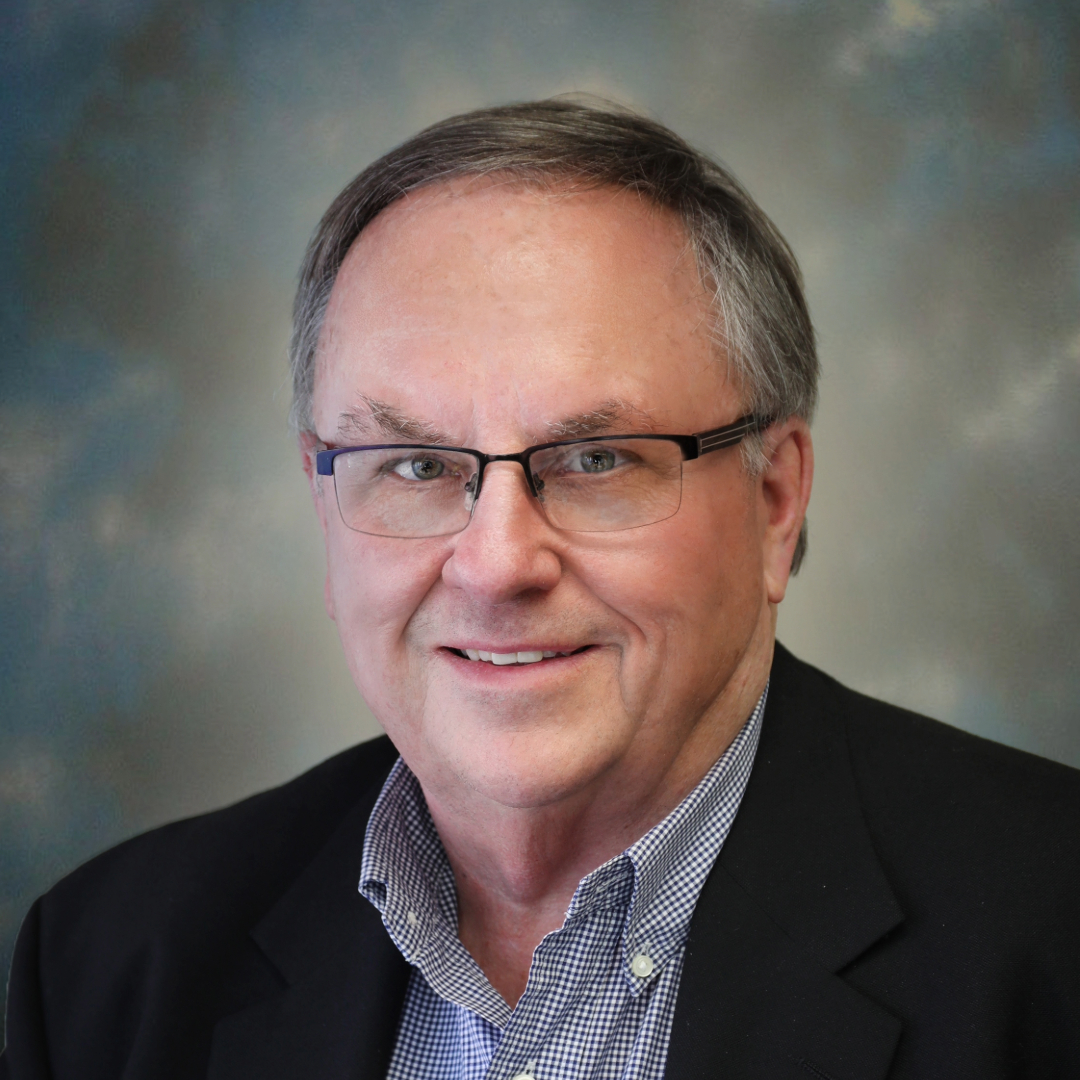
Ray O’Connor | Diocese of Grand Island, Nebraska
A businessman’s vision in founding charitable and educational initiatives has transformed his diocese
For decades, Ray O’Connor has been a driving force behind the spiritual and social growth of the Diocese of Grand Island. A real estate developer and philanthropist, O’Connor has used his professional expertise and deep faith to serve his parish, his diocese and the wider Grand Island community.
Together with his wife, Jennifer, O’Connor has been deeply involved in parish life at St. Mary’s Cathedral. In the early 2000s, he co-chaired the effort to build St. Mary’s Cathedral Square, which today houses parish offices, faith formation programs, and community gatherings. His commitment to the Church has extended to the diocesan level, where he has served on the Finance Council and Building Committee and has helped lead the annual Diocesan Appeal.
“O’Connor’s generosity has had a tremendous impact on forwarding the cause in our diocese,” said Bishop Joseph Hanefeldt. “Ray and Jennifer are such wonderful benefactors to the Church.”
-
Read more
O’Connor’s contributions go far beyond brick and mortar. He is a man of deep compassion for the poor and marginalized—particularly for Grand Island’s immigrant population, which includes families from Mexico and Somalia. His philanthropic efforts have touched the lives of thousands through his support of education, housing and faith-based initiatives.
In 2009, O’Connor was instrumental in bringing Spirit Catholic Radio to Grand Island, helping expand its reach across the diocese. He even donated office space to the station when it lacked a local presence. More recently, he has provided property to expand diocesan offices.
His contributions to supporting education in the city were formally recognized with the naming of the O’Connor Learning Center, which now serves as the early childhood education site for Grand Island Public Schools.
O’Connor is known not only for his generosity, but for his readiness to act. He is quick to offer assistance—whether through his time, resources or expertise. Deeply invested in the growth and vitality of Grand Island, he sees challenges as opportunities to improve the community for everyone. He helps Church leaders and civic partners alike navigate complex issues with clarity and compassion.
Through his selfless giving and servant leadership, Ray O’Connor continues to be a vital force for good in the Church and the Grand Island community.
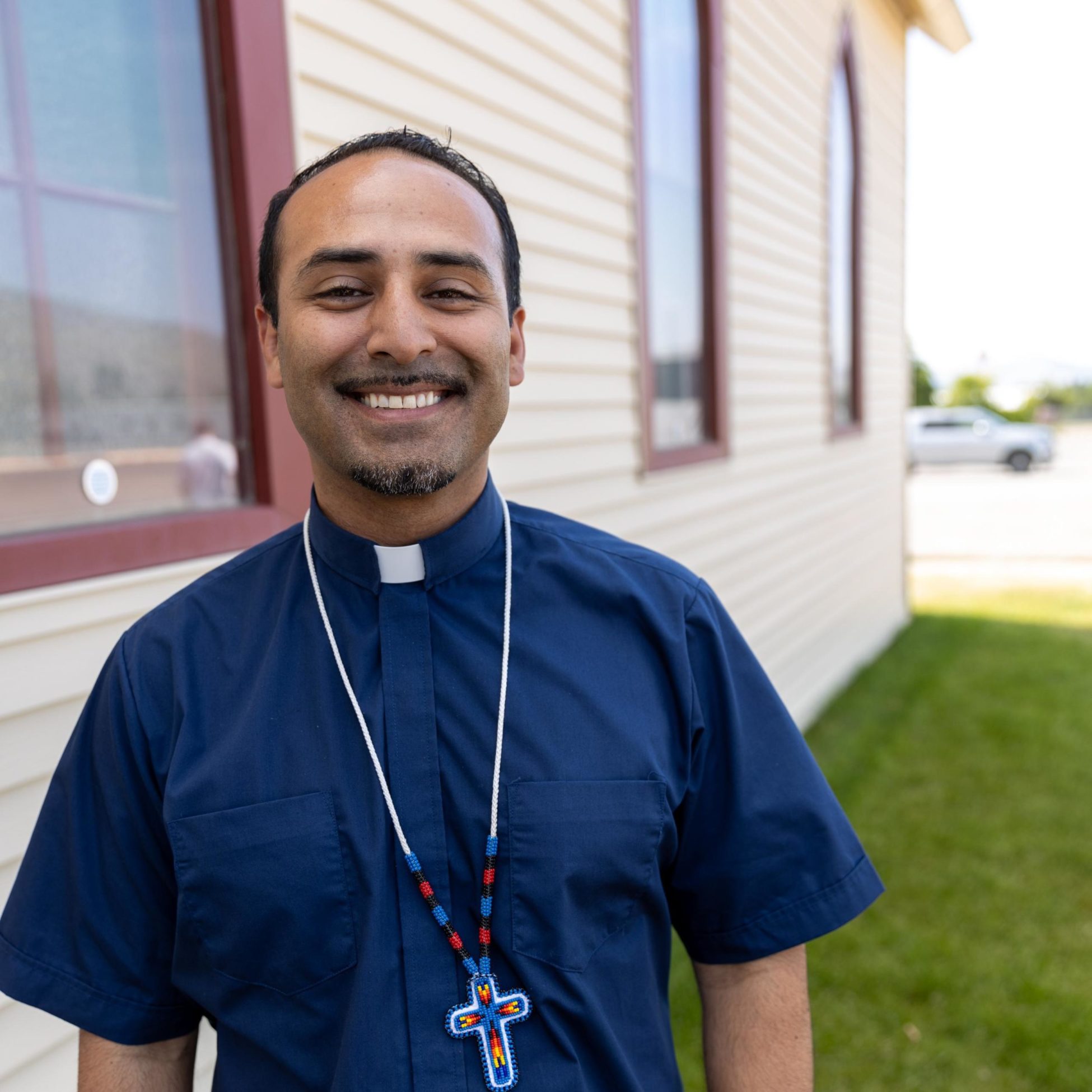
Father Victor Cancino, SJ | Diocese of Helena, Montana
Meet the beloved Jesuit priest serving the Flathead Indian Reservation
The Native American communities Catholic Extension Society supports today represent 40 distinct tribes, nations and reservations. We witness that the Catholic Church today is a source of hope, a source of healing from years of trauma and a voice of affirmation and empowerment to Native peoples.
For that to happen it takes leaders in our Church to walk with and simply be present to the people of these communities. Father Victor Cancino, SJ, is one of these special individuals. He serves three mission churches on the Flathead Indian Reservation in western Montana: St. Ignatius, Sacred Heart and St. John Berchmans which are supported by Catholic Extension Society.
Father Cancino’s constant presence, attentive listening and genuine care for people who often feel overlooked creates a space for healing and connection, but most importantly—for trust.
-
Read more
“Once you build trust through honesty and respect, the possibilities are endless—whether it’s outreach at a basketball game or opening a women’s rehab center. Just showing up, learning names and connecting creates a path to healing,” Father Cancino said.
By participating in events like three-day funerals, prayer services and communal meals—often incorporating traditions such as hymns and the rosary—he fosters a sense of belonging and validation for families.
At one recent funeral, Father Cancino sat with a Salish Native family mourning the loss of their infant daughter. His presence reflects his character as a priest who prioritizes being with people in their moments of greatest need, embodying a quiet, supportive faith.
The night before the funeral, Father Cancino prayed with the family alongside the Salish choir, singing hymns and reciting the rosary in Salish—a testament to his respect for and integration of Native traditions into Catholic practice. Father Cancino is seen as a dedicated and respectful bridge-builder by the people he serves.
Father Cancino also strives to support communities in struggles with high suicide and addiction rates. In particular, his work with women in recovery offers a path to healing for Native and non-Native women battling addiction and abuse. The values of faith and determination he instills in those he serves have a transformative effect.
Outside the church and within the larger community, Father Cancino is among leaders helping build awareness for the epidemic of thousands of missing and murdered native women who have never been found. Along with his people, he dreams of ending this unspeakable and all-too-frequent violence again women.
“Father Cancino’s work extends far beyond the walls of the three churches he shepherds,” said Diocese of Helena Bishop Austin Vetter. “His presence in deeply sacred moments provides comfort, reconciliation and a bridge between the Catholic faith and Indigenous traditions. His ministry thrives through his faith-driven tenacity.”
The bell tower of St. John Berchmans Mission resembles a lighthouse—and that’s entirely intentional. In a community seeking hope and direction, the light of Christ serves as a guiding force. Father Cancino stands as one of the faithful who helps carry that light forward.
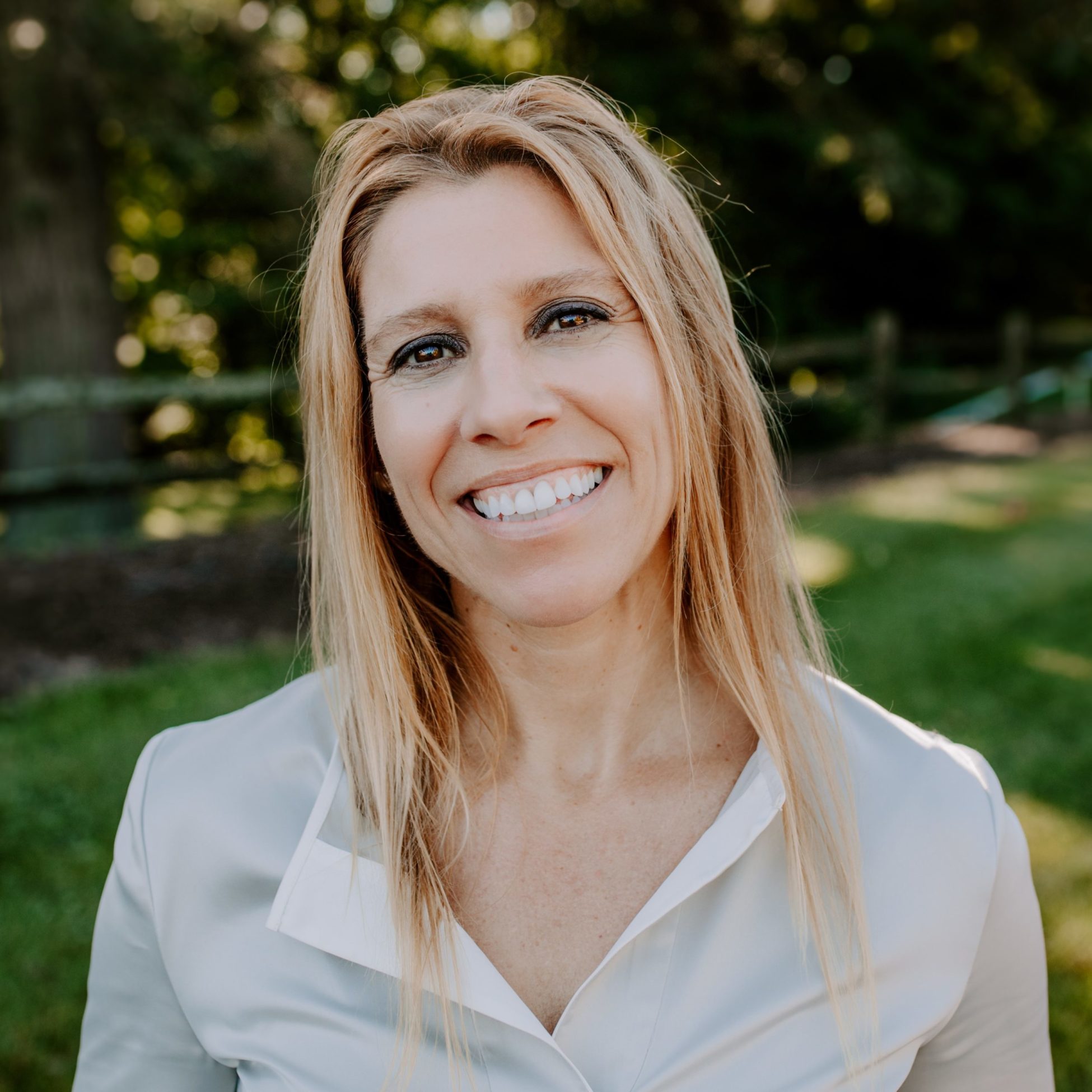
Sherry Gesmundo | Diocese of Kalamazoo, Michigan
She fundraises so that others may grow in their faith
Joseph Campbell once wrote, “Money is congealed energy, and releasing it releases life’s possibilities.”
Sherry Gesmundo is doing everything possible to release “congealed energy” in her diocese. She and her husband are nearing the completion of “The Sanctuary,” a 2,500-foot path nestled in the serene beauty of mature white pines in southwestern Michigan.
And this will not be just any path.
Their dream is that “The Sanctuary” will inspire the faith of generations to come, providing a refuge for those among us who do not know about Christ’s love while offering all a place of meditation to grow deeper in relationship with God.
Through the expression of extraordinary art set along the trail, “The Sanctuary” will tell the story of Christ’s journey to Calvary through 60 larger-than-life bronze sculptures, identifying the 14 encounters Christ had along this path of sorrows known as Via Dolorosa.
-
Read more
In encountering the sculptures of Christ’s journey to Calvary, visitors who are lost, suffering and yearning to feel love will in turn have their own faith deepened by Jesus who holds nothing back in love.
Of course, this vision needs financial resources to make it happen.
Gesmundo has developed a Legacy Giving Society called the Lumen Christi Society (LCS). To date, almost $100,000 has been raised by the Lumen Christi Society, a lifeline to many small but mighty organizations.
Gesmundo explained that her goal is to grow her own Catholic faith while inspiring others to come to the faith as well. This year she aims to help over 1,000 people deepen their faith while walking “The Sanctuary.”
Gesmundo’s fundraising is releasing the congealed energy that money represents. She is making exciting possibilities like “The Sanctuary” come to life in southwestern Michigan because, truth be told, we all need a sanctuary.
Professor Campbell would agree.
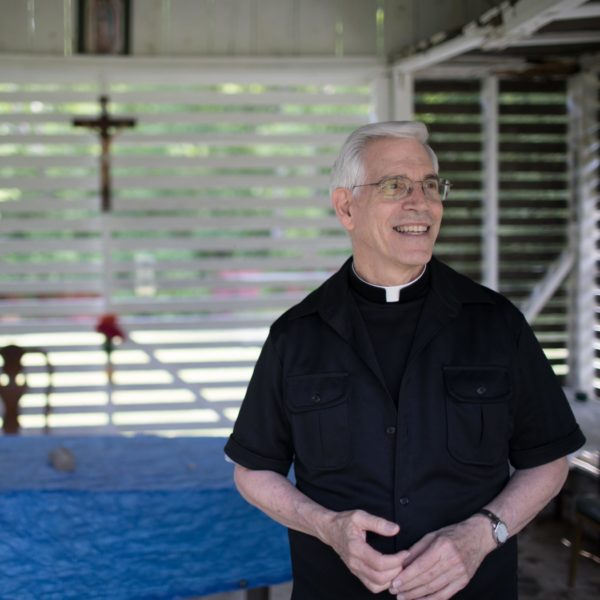
Reverend Tom Charters | Diocese of Knoxville, Tennessee
Small-town priest responded heroically when epic floodwaters came
When it comes to a moment of acute crisis, we act in continuity with the way we have always lived. It is as if we have practiced all our lives for that time of supreme need.
On September 27, 2024, the remnants of Hurricane Helene tore into the eastern Tennessee Valley, bringing “once in a millennium” floodwaters. St. Michael the Archangel Parish in Erwin, Tennessee, built with Catholic Extension Society’s support in 2018, was located just uphill from the river where the worst of the flooding occurred. The flooding wiped out houses, businesses, roads, bridges and sadly the lives of several people from the town. A dozen Hispanic workers at a local factory were swept away—four of them parishioners at St. Michael the Archangel, all of them fatalities.
Reverend Tom Charters, pastor of St. Michael the Archangel Parish, then 74 years old, knew what to do. He had been practicing all his life.
-
Read more
During his 50 years as a Glenmary Home Missioner, Father Charters had served as pastor in five states. He was a joyous priest who excelled in the ministry of presence.
Little did Father Charters know what would be required of him when the floods hit in September 2024. Patients, doctors and staff had to be evacuated from the nearly flooded rooftop of Unicoi County Hospital. Homes, roads, bridges and businesses were swept away.
Through it all, Father Charters exercised his ministry of presence, consoling and serving the families and friends of those who died and those still missing at the time.
Father Charters, with the help of many volunteers, turned St. Michael the Archangel Parish into a flood relief center which provided food, water, sleeping bags and tents, heaters and fuel, and financial assistance to the people of Unicoi County.
Father Charters also coordinated the funeral Masses of the four parishioners lost in the flood. When the family of one victim asked that the victim’s body be brought back to Mexico for burial, Father Charters immediately led efforts to ensure the wish of the family was fulfilled.
Father David Boettner, while accompanying Diocese of Knoxville Bishop James Mark Beckman to visit the area following the deadly floods, said, “Everywhere we went with Father Charters, every person in Erwin knew [him] and was consoled by his presence no matter where we were.”
Father Charters had been practicing all his life for that time of supreme need. He believed, “Unless you take Jesus who you’ve received in the Eucharist and go forth and carry it to others, it’s not worth it—you are the missionaries! You have to go forth and do it.”
And that is what Father Charters, 50 years a priest and missionary, did and does still today.
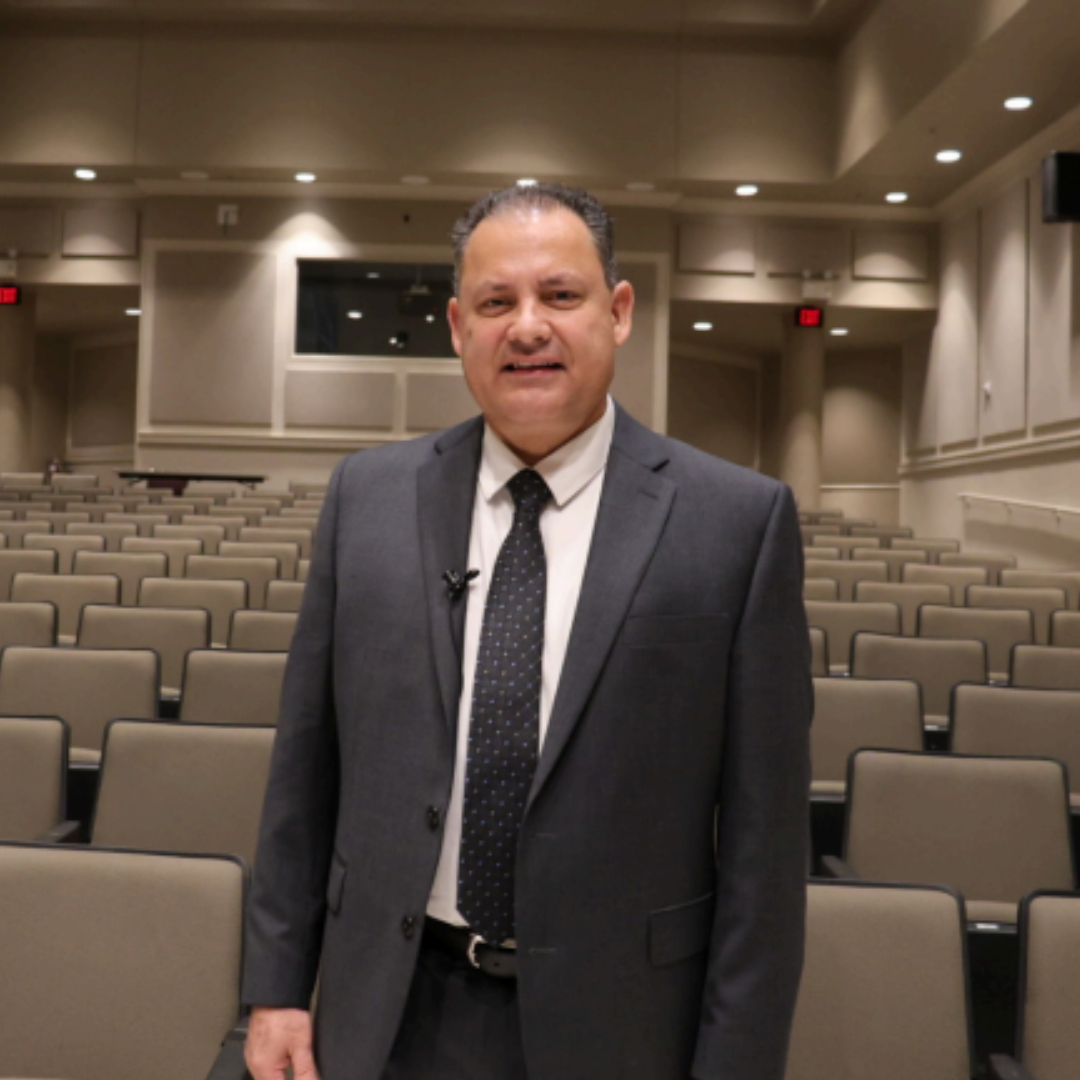
Deacon Carlos De La Peña | Diocese of Laredo, Texas
Humble Texas servant accompanies the forgotten
For over a decade, Deacon Carlos De la Peña has faithfully served at Our Lady of Lourdes Mission in Seco Mines, bringing spiritual guidance to those in need. His ministry reaches far beyond the church walls—whether called upon to visit a hospital patient, a family member facing surgery or someone seeking solace in trying times, he answers with a heart full of humility.
A pillar of Deacon De la Peña’s ministry is his work with inmates at the federal prison in Eagle Pass. Here, his pastoral care takes a powerful form—as a dentist, he offers not only spiritual nourishment but meets them on a human level by providing dental care to the prisoners. Through this accompaniment, he reveals God’s presence in a place often marked by despair. Deacon De la Peña’s presence exemplifies a calling to serve the forgotten with patience, mercy and love.
-
Read more
Bishop James Tamayo of the Diocese of Laredo has notably recognized Deacon De la Peña’s profound commitment to prison ministry, a testament to his unwavering devotion to those society often overlooks. “Deacon De la Peña has been an extraordinary volunteer, tirelessly dedicated to multiple ministries in Eagle Pass, Texas. He has never wavered in his dedication and commitment to service.”
Elsewhere in the community, the deacon’s ministry extends to serving as a guest speaker at marriage and healing retreats, where he and his wife, Veronica, have shared hope with thousands, inspiring healing and marital renewal.
Deacon De la Peña and his family have also cultivated a rich tradition of prayer, hosting monthly rosary gatherings in honor of Our Lady of Fatima for over 24 years. These gatherings have drawn thousands, creating a vibrant community united in faith and devotion.
“I can feel it and see it in their faces. When you pray with someone, the tension and fear disappear from their face and body. They are overcome with serenity and peace. God is there with them,” Deacon De la Peña said.
Deacon De la Peña’s ministry radiates Christ’s light through his compassion, words and unwavering presence. He is a true servant leader whose faith and accompaniment moves hearts. His life and work stand as a living testimony to the power of God’s love working through humble service.
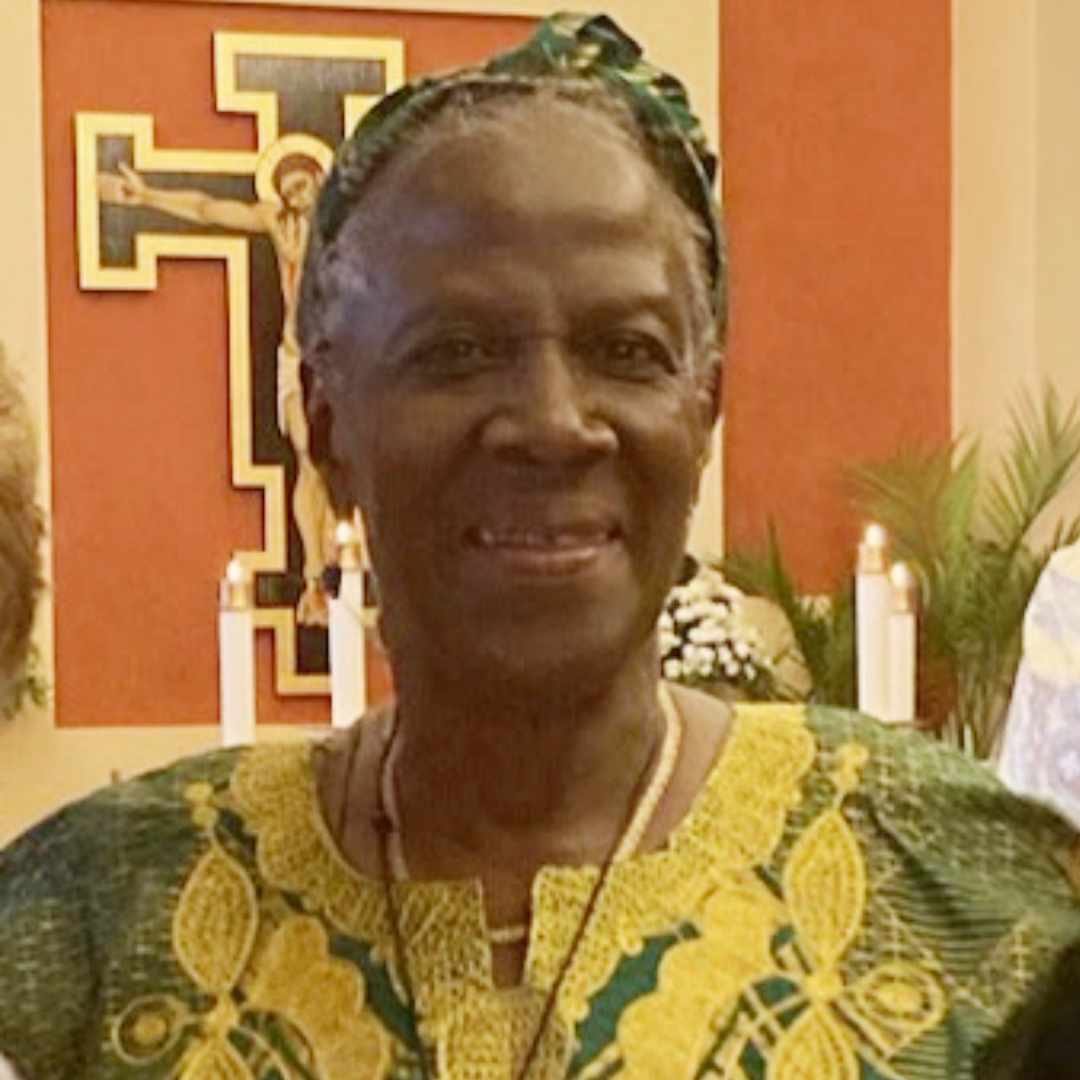
Deanna Gibbs | Diocese of Las Cruces, New Mexico
Empathy empowers this woman’s care for the forgotten
The Catholic Church teaches that the Holy Spirit gives seven gifts: wisdom, understanding, good counsel, fortitude, knowledge, piety and fear of God. One more could be added to that list—empathy. Empathy helps the Holy Spirit move. Empathy is the great connector, turning one person’s trials into grace for another.
Deanna (Dee) Gibbs exemplifies the power of empathy, and her ministry in the Diocese of Las Cruces is proof positive.
Gibbs is a widowed immigrant from Panama whose trials have empowered her to care for immigrants and refugees from all over the world seeking a better life. She has been integral for Holy Cross Retreat Center in Mesilla Park, New Mexico, where she welcomes her brothers and sisters from Latin America and refugees from other parts of the world. Those who have endured much suffering along their journeys find their spirits lifted and the feeling of being human again through Gibbs’ empathy. She cares for babies, advocates for children and families and provides clothing and personal supplies, allowing those stripped of all they had to leave the retreat center with dignity and joy.
-
Read more
In one case Gibbs acted as a surrogate mother for a teenager whose mother and brother had been deported; the teen’s father was unable to be involved because of his understandable fear of being in the public eye. Gibbs made arrangements at the teen’s school and took him to medical appointments. Years later, this young man applied for his father’s immigrant papers and helped his dad become a lawful resident.
Gibbs explained her motivation simply: “These are my brothers and sisters, and to offer them a place where they can rest and feel appreciated as a human being without judgment is my heart and soul. The Holy Spirit guides you, if you are paying attention.”
Gibbs is 79 years of age, and one of her goals this year is to practice 79 acts of kindness to “thank God for the gift of life and for all His blessings.” It’s difficult to measure how many lives have been impacted by Deanna Gibbs through her 63 years of ministry. There are literally thousands who have been touched by her and the Holy Spirit.
Wisdom, understanding, good counsel, fortitude, knowledge, piety and fear of God—all gifts of the Holy Spirit. Gibbs is living proof that empathy is also a gift of the Spirit.
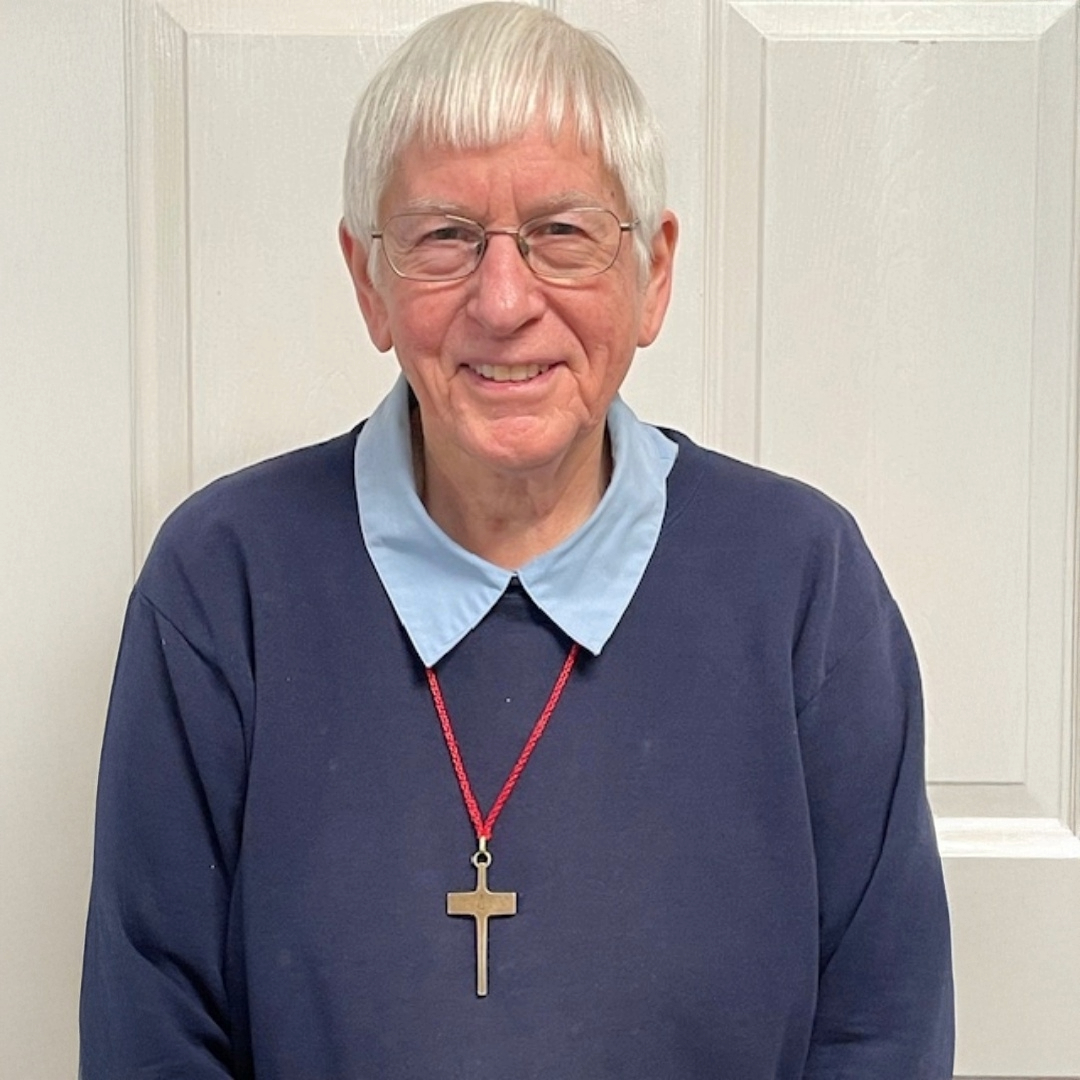
Sister Pat Cataldi | Diocese of Lexington, Kentucky
The surgeon nun in Appalachia: a global mission of healing
There are many abbreviations that follow the names of women religious, indicating their religious order: for example, BVM (Order of the Blessed Virgin Mary), OSM (Sisters of Mercy) or OSB (Sisters of the Order of Saint Benedict).
But MD? These are the initials that follow Sister Pat Cataldi’s name. It is not her religious order’s abbreviation. It is her profession. She is a medical doctor, a surgeon to be exact. And this is just one aspect of this remarkable woman’s ministry.
Sister Pat graduated from Hahnemann University Medical School in Philadelphia, in 1977. Specializing in general surgery, she completed her residency in 1982 and learned of an opening for a surgeon at St. Jude Hospital in Vieux Fort, St. Lucia, West Indies. Yes, the West Indies. Sister Pat does nothing the easy way. It wasn’t easy being a surgeon in the developing world, but people were counting on her. At one point in this position, she performed surgery on a child with a partially collapsed skull.
-
Read more
In 1988 Sister Pat transferred to a hospital in Zimbabwe on the Botswana border. It was a 180-bed hospital with five outreach clinics. The hospital had electricity for a very limited number of hours each day, and sometimes they would have to wait for supplies to come in before performing a surgery or improvise with what they had.
Still called to be a medical missionary, she left Zimbabwe in November of 2000 for eastern Kentucky, also a place of great poverty and medical need. There she joined the surgical staff at Three Rivers Medical Center. It was during this time that she did surgical consultations at Big Sandy Federal Prison. She performed minor procedures at the prison on those prohibited from leaving the facility and major surgery at the medical center when needed. One prisoner compared her to Mother Teresa, likely the highest compliment any surgeon has ever received.
Sister Pat went into “wound care” in 2005 to serve the suffering all throughout the Lexington area. She retired from active practice in 2015 but continued in the field by joining both the Lawrence County Health Action Team and the Kentucky Agency for Substance Abuse Policy and by serving on the Lawrence County Board of Health.
And as if her health practice were not ministry enough, she became an active member of St. Jude Catholic Church where today she helps with CCD; the liturgies; leading sacramental preparation for baptisms, first Communions and confirmation; and organizing parish operations. Sister Pat encourages parishioners to become engaged in stewardship efforts, inviting them to share their time, talent and treasure with the Church.
She also volunteers at God’s Food Pantry which serves 400 households a month and assists with emergency food rescue for those suffering from acute food insecurity. She also serves on the Citizen’s Climate lobby addressing the environmental damage caused by decades of coal mining.
So what abbreviation should follow Sister Pat’s last name? MVP (Most Valuable Professed)? GOAT (Greatest of All Time)? It is, in fact, CPS (Missionary Sisters of the Precious Blood). But AMDG (“Ad Majorem Dei Gloriam,” Latin for the “Greater Glory of God”) would do just as well.
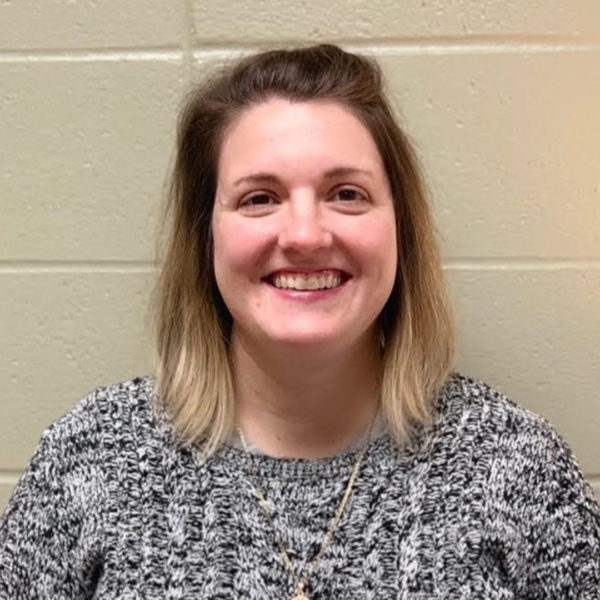
Kristy Dunn | Diocese of Little Rock, Arkansas
More than leading a thriving Catholic school, she built a community of care where all are welcome
Kristy Dunn has always felt at home at St. Theresa Catholic Church and School—first as a student, then a teacher and now principal since 2015.
Raised in Southwest Little Rock, Dunn grew up cleaning the halls of St. Theresa with her mother and grandmother. These ordinary moments became the groundwork for her vocation. They taught her the dignity of unseen labor—which today, allows her to empathize with the sacrifices the school’s Hispanic parents make to give their children the gift of a Catholic education.
Both her University of Dallas master’s degree in Catholic school leadership and experience attending the University of Notre Dame’s Latino Enrollment Institute complement her approach to education. She responds holistically, seeing her ministry as one of “mothering,” bridge-building and empowerment.
-
Read more
Dunn is deeply present to the needs of her school community. She knows each of her 244 students and their families by name. Examples of her accompaniment include grieving with families at hospitals, visiting them in their homes and helping parents navigate issues on immigration, to name a few. She once flew to California to visit a St. Theresa student who had been in the ICU for three months, providing moral and economic support during this painful period. She is a great listener who emanates both a mother’s love and the compassionate love of Christ.
“To talk about Kristy Dunn’s ministry at St. Theresa School is to explain to each family that our children are hers, that our problems are hers,” said Karen Aragon, a parent of fifth and eighth grade students. “It is to find a word of encouragement, a smile and a hug that comforts.”
Under Dunn’s leadership, St. Theresa’s school has grown from 150 to 244 students. The parish has expanded from 1,400 to 2,200 weekend Mass attendees. Inspired by the growing Latino population in her community, Dunn took it upon herself to learn Spanish (with the help of her students!). She said this has helped her “build a bridge to the Spanish-speaking people.”
She also credits her pastor, Father Stephen Gadberry, whose seminarian education Catholic Extension Society supported, for empowering her especially in decision-making spaces.
In 2017, she opened St. Theresa’s doors tuition-free to two newly arrived children from Guatemala. Recognizing food insecurity among immigrant families, Dunn applied for and was given a $50,000 grant from the Daughters of Charity, which she used with the help of staff and volunteers to launch a free hot breakfast program in 2019 for her majority low-income students. She also established a food pantry for families. The same grant subsidizes the school’s Extended Day Support Program, reducing the cost from $8 to $1 a day—making vital after-school care accessible.
Through initiatives like “Movement in the Mornings,” which promotes physical activity before classes, and her promotion of unity through school sports and community festivals, Dunn fosters a welcoming environment where children grow and blossom.
“I am being the Kristy God created me to be each time I respond yes to this ministry,” she said.
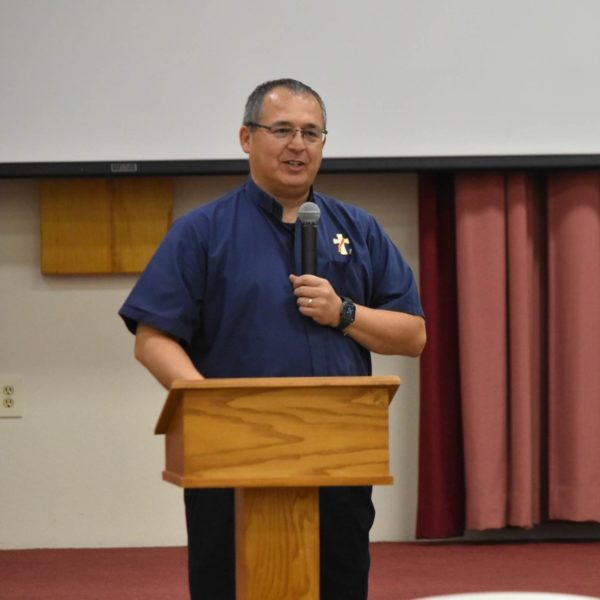
Deacon Adrian Jimenez | Diocese of Lubbock, Texas
This deacon does it all: youth ministry, marriage ministry and more
“Bi-location” means being in two places at once. “Tri-location” means being in three places at once. Being in four or more places should be called “Adrian-location,” because that is what Deacon Adrian Jimenez does. When it comes to his ministry in the diocese of Lubbock, Texas, Deacon Jimenez is ubiquitous (which is a fancy word for being everywhere at the same time).
To say that Deacon Jimenez wears many hats would be an understatement. He is the diocesan chancellor, the director of marriage and family life, the director of the Guadalupe Youth and Family Center and a deacon at St. Clare Catholic Church.
As chancellor, Deacon Jimenez preserves the diocesan archives with meticulous care. He safeguards diocesan sacramental records and oversees requests for dispensations related to the sacrament of matrimony.
-
Read more
His respect for the sanctity of marriage is expressed in his role as director of the Office of Marriage & Family Life. This office offers a robust range of programming, including six bilingual Catholic Engaged Encounter (CEE) retreats for soon-to-be married couples and two bilingual Marriage Enrichment Retreats for couples that have been married for a few years, as well as other programs.
His support for the sacrament of matrimony is a family affair. Deacon Jimenez and his wife, Dr. Rosalinda Jimenez, meet with Couples in Crisis every Wednesday afternoon. Through Couples in Crisis, the deacon and his wife have assisted forty-seven couples that were ready to throw in the towel. Only one has resulted in divorce—that’s a 98% success rate.
Everyone agrees that our youth are the future of our Catholic Church, but not everyone wants to work with teenagers. This is not the case with Deacon Jimenez. His visionary leadership led to the creation of the Guadalupe Youth and Family Center, which opened its doors on November 4, 2024.
The abandoned building was formerly a school Deacon Jimenez attended as a child. He used corporate connections with United Supermarkets, his employer of 30 years, to secure repairs at discounted rates. He supervised a complete roof replacement, repairs to missing sections of ceiling and replacements of many doors and glass panels.
More impressive still is the catechetical programming at the Guadalupe Youth and Family Center. He and his volunteers have created saint-themed rooms with vision boards. After-school activities, faith-formation classes and family counseling round out the center’s outreach. The center now stands as a beacon of hope, offering a safe and supportive space for youth and families to grow in faith and community.
Deacon Jimenez’s active ministry is rooted in prayer. He serves with grace at St. Clare Catholic Church, assisting in liturgical services and providing pastoral care to all. His presence at the altar reflects the servant leadership exemplified by Christ.
Bi-location? Tri-location? Adrian-location is how he does it, and the love of Christ is his fuel.
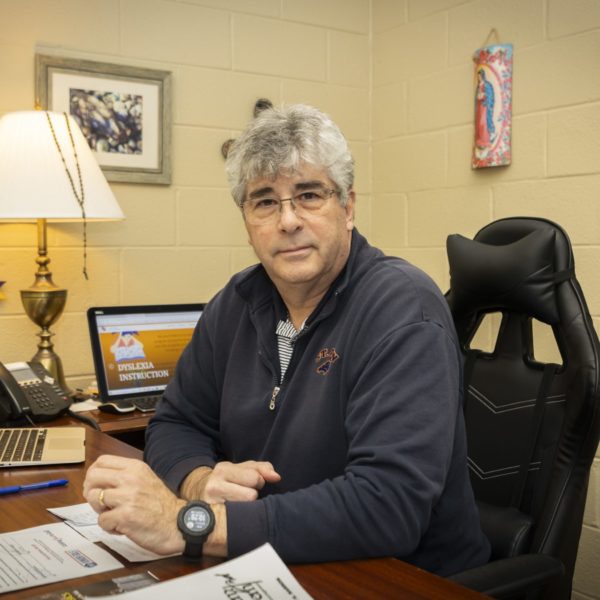
Didier Aur | Diocese of Memphis, Tennessee
A principal’s career defined by turning no one away
As a child, Didier Aur hated school. A native of Sao Paulo, Brazil, he moved to Memphis when he was just five years old. His grandparents were Lebanese—so at a young age he grew up hearing Lebanese Arabic, Brazilian Portuguese and American English. It made learning to read difficult. Those challenges were even further enhanced by his dyslexia—and schools did not understand the effects of dyslexia on reading and learning until the late 1970s and ’80s.
Today? Aur is a leader in Catholic education in the Diocese of Memphis—a career that has spanned 37 years. He is currently the principal at St. Ann’s Catholic School in Bartlett, Tennessee. Seven years ago, the school faced closure, but since Aur took over, enrollment has doubled. What’s more, in 2022 he started the Erika Center at St. Ann Catholic School, which educates 20 students with dyslexia each year. This fall, he plans to expand this operation to double the center’s enrollment to 40 and to rename it the St. Ann Dyslexia Center.
“Learning is for everyone,” Aur said. “That child who was behind was me, and I made it.”
-
Read more
Aur’s shift from disdain to passion for education was inspired by the Christian Brothers. At Memphis’ Christian Brothers High School, one of Aur’s teachers saw he had difficulty reading but pushed him to continue by letting him choose books on topics he enjoyed. This ignited his joy for learning, and in 1988 he graduated from the University of Memphis with a bachelor’s degree in education—and a master’s degree in special education.
After 10 years teaching at Christian Brothers High School, in 2002 Aur was asked to become principal of one of the diocese’s “jubilee schools.” The jubilee schools were a network of Catholic schools serving Memphis’ low-income families and under-resourced areas. In just four years, enrollment at Holy Name Catholic School, where Aur served, was at full capacity. As principal, he led two more jubilee schools over 19 years: Resurrection Catholic School and Memphis Catholic Middle and High School.
It’s a missionary approach to education that doesn’t turn away but rather goes out and finds more ways to help. Aur has certainly put this into place at St. Ann’s, especially in his efforts providing resources to assist even more children with dyslexia—so that they, too, can love to learn and read as he did.
Although the jubilee schools no longer exist, Aur feels that their spirit which advocated for students remains strong in the diocese’s schools. “We feel like that mission [of the jubilee schools] is still with us,” Aur explained. Speaking of his current school, St. Ann, he remarked, “When a family comes to us with little to no money, we’re not going to turn them away. That’s where our passion and where our heart is—we’re not going to turn people away.”
Seeing the transformation of the child makes it all worthwhile.
“When you get a child who gets a piece of paper and they can’t read, and by the time they go through the dyslexia center they can’t wait to read—it’s incredible,” Aur said. “Their self-esteem goes from no self-esteem to where ‘I’m loving this,’ and those students come to school with a smile on their face; that’s the neatest thing.”
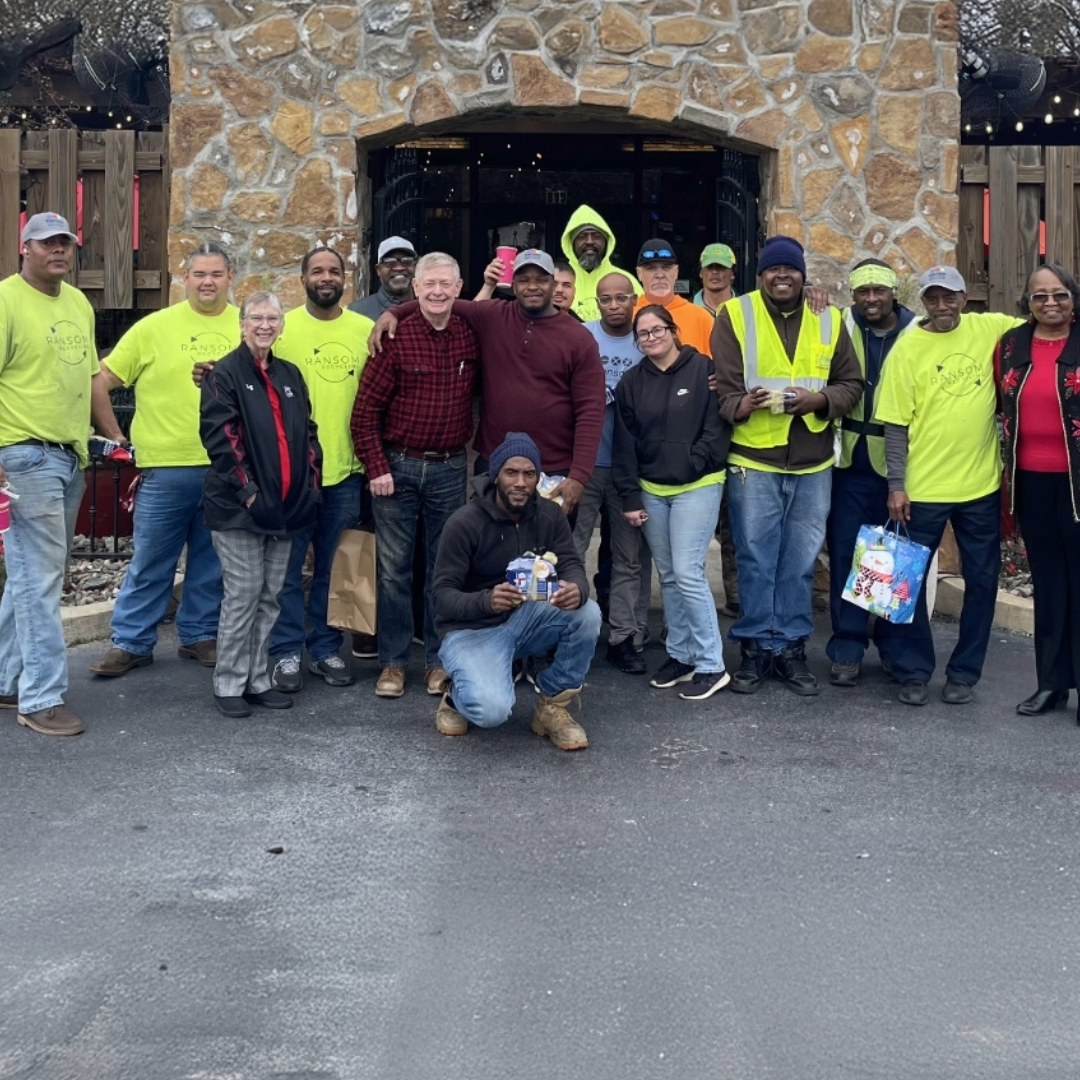
Jim Backes Jr. | Archdiocese of Mobile, Alabama
Alabama man helps inmates successfully reintegrate into society
After retiring from a successful engineering career, Jim Backes Jr. embraced a new calling: serving the incarcerated.
He quickly realized God was leading him to the “fringes” to encounter Jesus in men like Emmanuel, a former gang member he met inside Mobile County Metro Jail afflicted by addiction, deeply remorseful about his past—a man who remains nonetheless a child of God. Since 2013, Backes has made it his mission at Metro Jail to help these individuals transition back into society. He is grounded in the Archdiocese of Mobile Prison Ministry’s five core values: humility, diversity, empowerment, accountability and community.
Backes guides a team of volunteers to teach two weekly classes. Before the pandemic, the ministry baptized and welcomed into full communion over 30 inmates each year through OCIA. Though current jail restrictions impose limitations to offering OCIA, Backes’ team continues to bring hope and Catholic witness to this population.
-
Read more
His impact is also felt through his work as a consultant and coach for the leadership team of Metro Jail’s partner reentry program, Ransom Ministries. Backes helped expand Ransom’s “ReProgram” initiative for job readiness and skills training to establish Ransom Recycling in 2019. ReProgram participants can earn an income while applying their skills recycling electronics. In 2024, Ransom Recycling grew from eight to 24 trainees and tripled its recycling output by processing 550 tons of e-waste, up from 150 the previous year—all while maintaining a less than 15% recidivism rate.
Amanda Hulsey, office manager at Ransom Ministries, praised the success of these revitalization efforts: “Jim has been instrumental in helping the trainees within our programs gain the confidence and skills they need to succeed, creating an atmosphere of hope and opportunity for them as they move forward in their lives.”
Lawrence Franklin, who met Backes through ReProgram, wrote: “Jim’s volunteer work is not just about service—it’s about transformation. … What sets Jim apart is not just his knowledge or experience, but his heart for people.”
That heart has shaped the lives of over 20 Catholics who have served as coaches, teachers or other volunteer roles in the jail and reentry ministries. Many of them say they are more confident, open-minded and service-oriented because of Backes’ unwavering support.
Beyond jail walls, Backes served on the Board of the Mobile Area Interfaith Conference (MAIC) from 2016 to 2020. He helped launch and expand The Neighbor Center, MAIC’s reentry program supporting formerly and currently incarcerated individuals. The center quadrupled in size and secured a $900,000 federal grant to create a job-readiness curriculum inside Metro Jail.
Backes’ selflessness, empowering spirit and faithful presence are rooted in this one profound question: “In our work, whose soul is being saved?” In the souls of the inmates where “He is already there” (Pope Francis, in Gaudete et Exsultate).
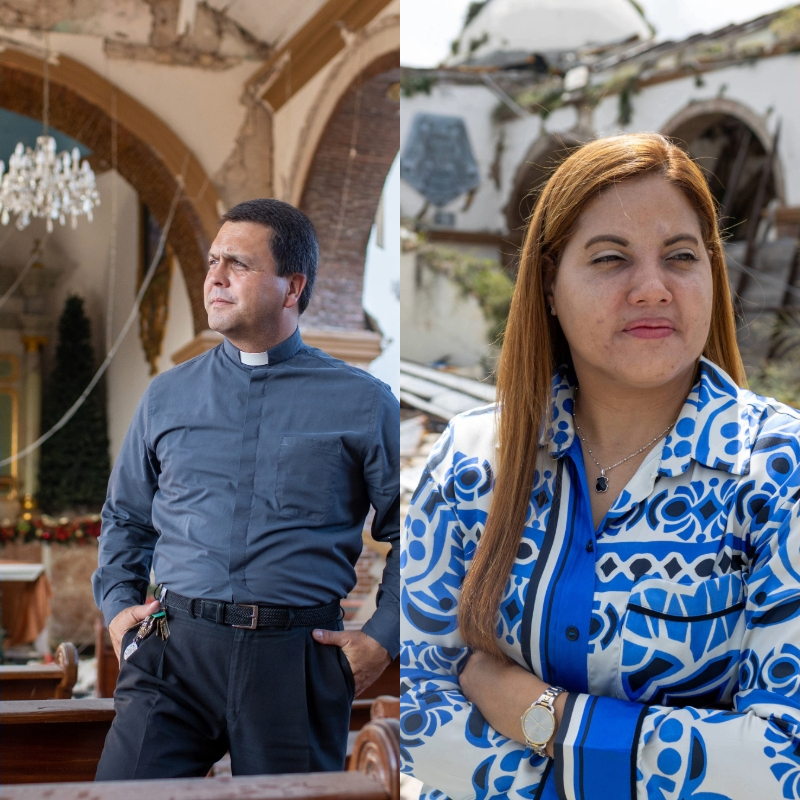
Father Melvin Diaz and Carmen Alicia Rodríguez Echevarría | Diocese of Ponce, Puerto Rico
A pastor and hs parish school principal help community rise from the rubble
Immaculate Conception’s pastor and parishioners have had more than their fair share of bad luck. Immaculate Conception Church in Guayanilla, Puerto Rico, collapsed from the earthquakes that devasted Puerto Rico in January 2020. They didn’t have time to even take down the Christmas decorations. The church walls collapsed on part of the parish school.
Then in 2022 Hurricane Fiona roared in, took what remained of the church roof and deposited it next to a white tent used for the Eucharist and a temporary school lunch room. As St. Teresa of Avila quipped, “Lord, if this is how you treat your friends, it is no wonder you have so few.”
But really, bad luck has nothing to do with this. This “bad luck” is a staging area for a new rising. The paschal mystery is afoot.
Father Melvin Diaz, pastor of Immaculate Conception, and Ms. Carmen Alicia Rodríguez Echevarría, parish school principal, refused to give up, even though their church is totally destroyed, and their school is half destroyed. Together they decided that this church would take on a new mission and new purpose in their devastated community.
-
Read more
Rodríguez is homegrown. She was born in Guayanilla and went to school and graduated from Immaculate Conception. She is a proud parishioner. She believes in this place with all her heart. She sees the paschal mystery unfolding.
Rodríguez has a master’s degree in education and a Ph.D. in adaptation, creativity and never losing heart. When her pastor asked her to help rebuild the school and parish following the 2020 earthquakes, she emphatically said yes.
Immaculate Conception School had only 90 students when she joined. Many local people had left the area. Thanks to her and Father Diaz’s relentless efforts, enrollment is now at 229. She believes the school’s attendance will continue to grow in the next few years.
Nothing stands in the wrecked remains of the church. Foliage grows between the cracks in the tilting church dome. Engineers worry that there may be significant damage to the church’s foundation—often the worst damage is unseen.
Immaculate Conception Church was built in 1841. It is a historical site, and the road to rebuilding the church and school is painfully long.
But the truth is that even though the church building is wrecked, what is rising now needs no brick or mortar. Immaculate Conception’s foundation is rock solid. Stronger than ever.
Father Diaz, Rodríguez and the parishioners and students at Immaculate Conception have withstood the twin calamities of hurricanes and earthquakes. But as a community, they are infinitely more powerful. The paschal mystery is afoot.
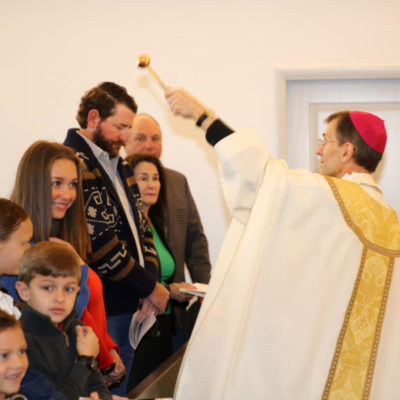
St. Rita of Cascia Mission | Diocese of San Angelo, Texas
A Catholic boom in the oil fields of West Texas
St. Rita of Cascia Mission is new in West Texas.
The church was dedicated just last year, and already the parish has 100 registered families. For unincorporated Greenwood, Texas, this is clearly a sign of excitement for the present and future of the Church in this rural community—and for the whole Diocese of San Angelo, for that matter. St. Rita of Cascia is the first new parish built in the diocese in 34 years, a project proudly supported by Catholic Extension Society.
“Catholic Extension Society has, and continues to be, an integral part of our diocesan Church in West Texas,” said Diocese of San Angelo Bishop Michael J. Sis. “Now, Greenwood has an oasis of faith in the middle of their own community. From the very beginning, I could sense the loving hand of God at work in this community.”
The people of Greenwood were longing for a place where they could build a community of faith with one another. While the well-populated and nearby city of Midland, Texas, is a place people can go to fulfill their sacramental needs, they don’t feel they can gather together there in faith on a regular basis with their neighbors. St. Rita of Cascia offers the people of Greenwood a place where they can unify and grow alongside each other.
-
Read more
This mission church may be new to West Texas, but its namesake, St. Rita of Cascia, has been long revered in the region. About 70 miles south of Greenwood is the site of a piece of West Texas history named for the Italian nun. Santa Rita #1 was the name given in 1923 to the first well that would strike oil in the Big Lake Oil Field. The name was inspired by a priest who was skeptical they’d find oil and suggested they intercede to St. Rita, patron saint of the impossible. The oil discovery ended up sparking the development of the oil and gas industry in the Permian Basin, a major and lasting shift in the economy of the area.
A century later, the effects of St. Rita’s powerful intercessory prayer are reflected in the establishment of this new community in Greenwood. A new parish or mission in such a sparsely populated area speaks well of the spirit of the people and their hunger for more ministry. There was the oil boom of the 1920s, and now there is the Catholic boom of the 2020s. Let the faith continue to grow and prosper in Greenwood and throughout West Texas.
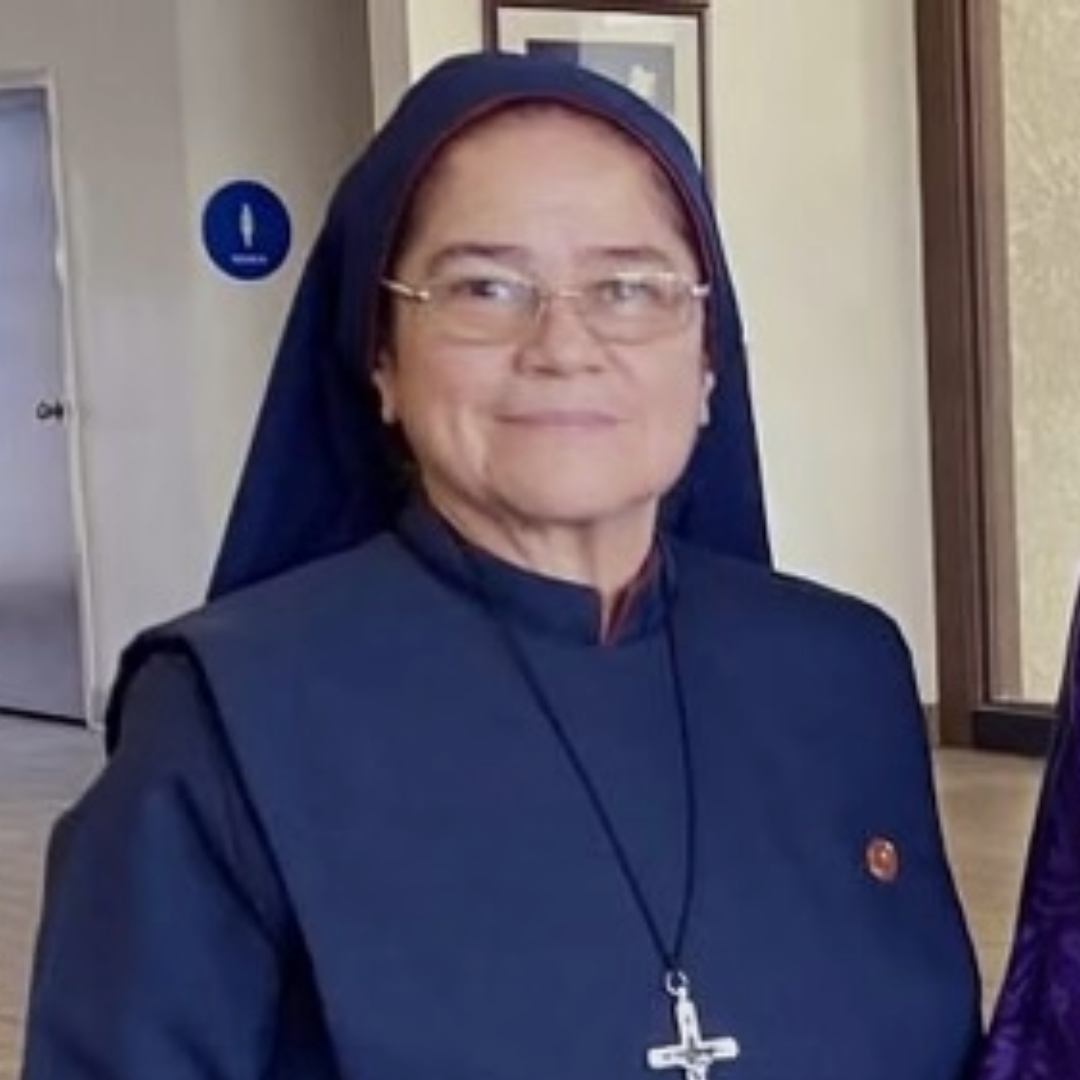
Sister Maria Rosario Coronado, E.E.P. | Diocese of San Bernardino, California
A tiny nun with an outsized presence in Southern California’s prisons
In Matthew 25, Jesus makes it clear that caring for those in prison is one of His highest priorities. He teaches that seeing the imprisoned is to see His face.
Sister Maria del Rosario Coronado Gutiérrez lives out Jesus’ call to care for the incarcerated. Sister Maria has been a women religious 41 years. One would not expect to see a petite sister, barely topping five feet, confidently walking through a prison, but that is where this sister with a beautiful smile and kind word for all spends her time.
This year Sister Maria will complete 20 years of serving in the ministry of prisons and jails within the Diocese of San Bernardino. She is the Catholic Church’s presence at the Victorville federal prison, Ironwood state prison, four detention centers and various juvenile halls and other county jails.
She works within the Department of Life, Dignity and Justice of the Diocese of San Bernardino, providing continuous ministry for these prison institutions.
-
Read more
During her presence of 20 years, Sister Maria has carried out ministry to prisoners, their families and their spouses. The diocese provides her with materials allowed in these centers such as Bibles, missals, rosaries and cards, but on her own she obtains scapulars and other catechetical materials to share.
Sister Maria invites volunteers into her prison ministry as well, coordinating the calendars of 35 volunteers to ensure they are available for visiting days. In order to visit the many prison sites, the calendar is filled Sunday-Monday, Wednesday-Thursday and Saturdays.
She is also in charge of helping priests and volunteers across the diocese to form prison ministry teams which help organize the liturgies, prepare inmates to receive the sacraments, and support prisoners’ families through virtual meetings and phone calls.
Many of the inmates are parents who desperately miss their kids. Sister Maria helped organize a “Get on the Bus” program that takes children to visit their parents on special dates. Sister Maria often goes with the children to help them through these emotionally fraught reunions.
There are many artistic representations of the face of Jesus. But Sister Maria knows what He looks like. She sees Him every day in the faces of the imprisoned. And those who are incarcerated, in turn, see the face of Jesus in Sister Maria.
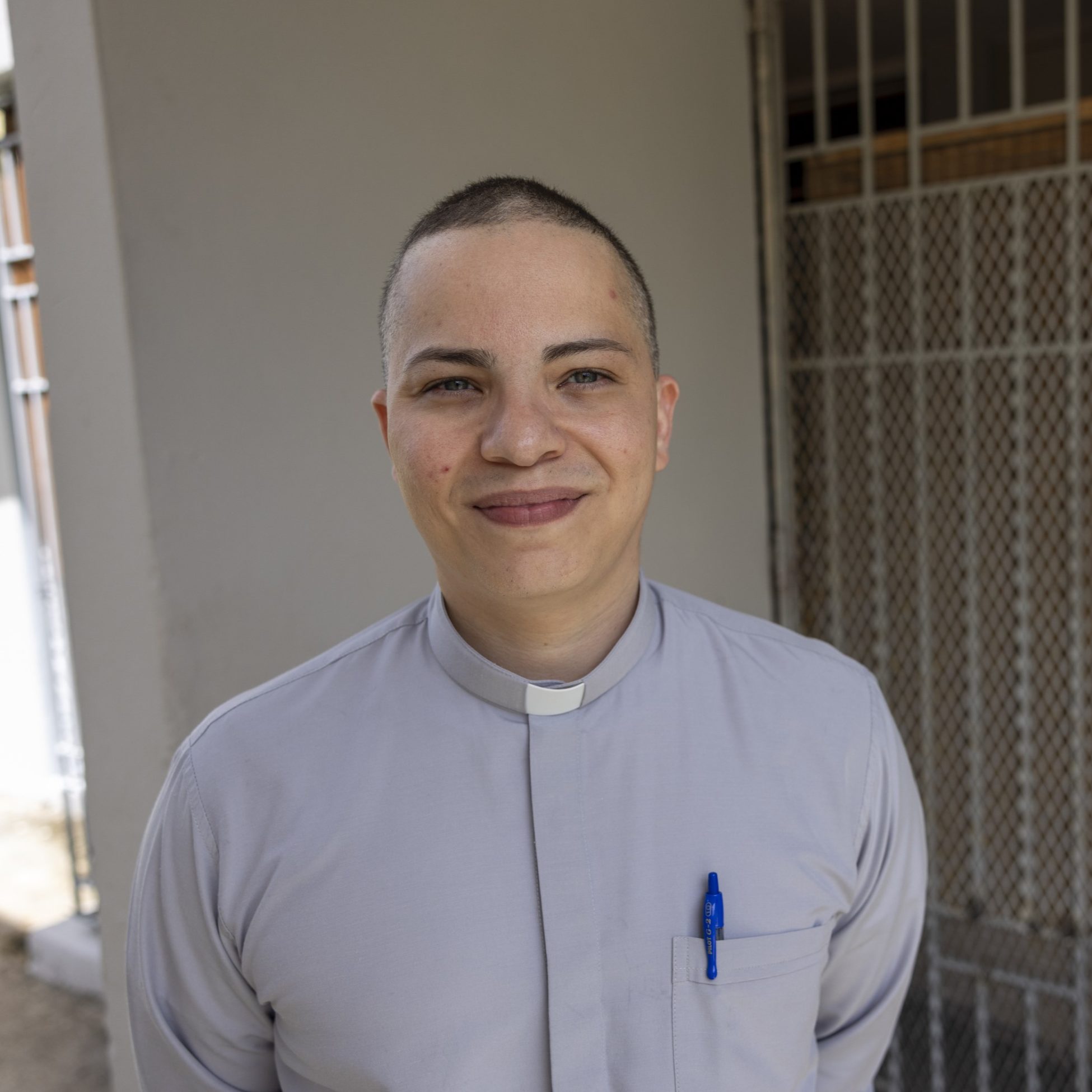
Father Rafael García Molina | Archdiocese of San Juan, Puerto Rico
Pastor’s program for low-income neighbors elevates entire community economically and spiritually
Father Rafael García Molina doesn’t want to just tell people about God. He wants them to encounter God, through their actions.
He and the parish he leads, Santa Luisa de Marillac, are next-door neighbors with over 600 residents of an adjacent low-income housing complex. He is spearheading a program that recognizes their gifts and provides them uplifting opportunities.
The interactions between the parish and housing community are not one-way. Father Molina said he is not here to “fix” them. Rather, the relationship is reciprocal—an opportunity to walk together. He believes these neighbors are bringing the face of God to his parish and the wider community.
-
Read more
Father Molina understands the painful realities of poverty and the afflictions that so often coincide with it, such as drug addiction, which took the life of his brother just two years ago. He witnessed firsthand the suffering that addiction caused to everyone who loved his brother, especially his mother.
About 100 residents of the housing community are elderly. Some of them lack mobility and struggle with cleaning and obtaining essentials such as groceries. Other residents are single mothers who need help with childcare. Some have difficulty transporting their special needs children to medical appointments.
The program, which is operated in partnership with the housing authority, pays other residents within the low-income housing community to provide these services to their neighbors. This builds community, trust and fellowship, while also providing jobs for many of the residents. This system elevates the entire community socially and economically.
Managing the program requires much patience, organization and, of course, funding. However, Father Molina, who previously served at an extremely poor parish, knows that God will provide. “I’ve never been afraid because I believe that God, if He wants it, makes things happen,” he said.
The parish has grown quickly since Father Molina’s arrival two years ago. Under his example of grace, care and love, a growing number of families took notice and began to embrace their faith actively. Now, this faith community is bustling. Practically every hour, one of the parish’s 23 groups is making use of the church space. Many of these faithful are children, filling up the pews and engaging in the activities the parish offers.
“This is a parish that takes very seriously the love of God,” said Father Molina. “It’s very generous and committed.”
Here’s one way they have measured the growth: Previously, they could order 5,000 hosts for holy Communion and it would last them half a year. Now, they are lucky if that lasts them a month.
The parishioners also support their neighbors with assistance such as paying utility bills or providing goods such as diapers. Last year they gave out 100 backpacks for children going back to school. “Charity doesn’t have a creed,” Father Molina said. “But in doing it we see God.”
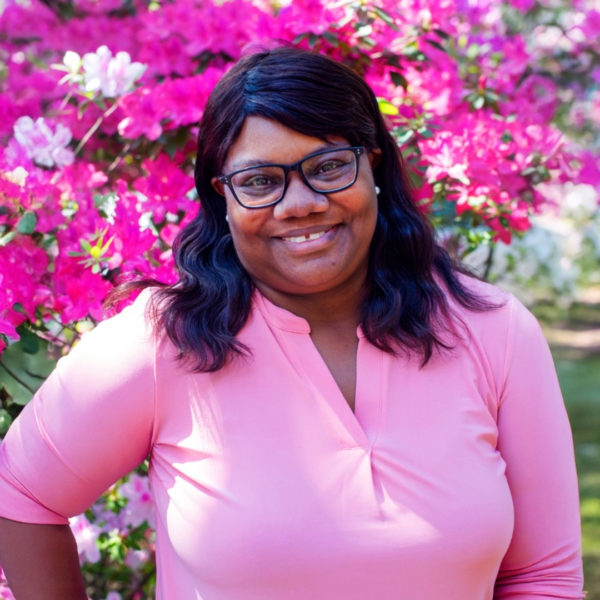
Latacia Avila | Diocese of Savannah, Georgia
She has spent her career expanding charitable care across 37,000 square miles of Southern Georgia
Seeing relief and gratitude in the faces of those whose dignity and lives have been restored invigorates Latacia Avila’s work each day. Leading Catholic Charities of South Georgia (CCSOGA, formerly Social Apostolate) in the Diocese of Savannah as executive director has exposed her to many dire needs in communities, but more importantly, to the humanity in every individual. For almost 20 years, Avila has tirelessly cared for and empowered poor, homeless, disabled and at-risk people.
Her college volunteer experience with female immigrant survivors of domestic violence through Catholic Charities of Atlanta launched her into a lifelong vocation to service, which she later deepened through her leadership at Social Apostolate, founded by the Franciscan Sisters in 1968. She credits the Social Apostolate’s their faith in action for bringing her to the Catholic faith in 2015.
From 2007 to 2018, Avila led and initiated programs with Social Apostolate. These include case management, employment resources, crisis intervention and managing finances. She continues making strides since becoming executive director in 2018 and since Social Apostolate was redesignated as CCSOGA.
-
Read more
CCSOGA has expanded its reach from four counties in the Savannah area to all 90 diocesan counties, helping 20,000 individuals. Avila’s bridge-building skills have been central to this feat—done not only with limited resources, but in the face of unprecedented events. One month after the transition to CCSOGA, tropical storm Debby hit, and six weeks later came Hurricane Helene’s entrance.
“Since the first moment I contacted Ms. Latacia, she was very approachable and interested in the necessities of our communities,” said Father Saimel Pedromo Lemus of St. Paul Catholic Church and Holy Family Mission. “She completed a delivery of supplies from Savannah and coordinated with me another one that came from a Catholic school in Indiana. She worked with our staff and volunteers and wanted to hear directly from parishioners to find the way to respond to them.”
Avila expanded on this, saying, “I firmly believe that it is our mission to meet people where they are. I am not afraid of change. My leadership style is to make the change to meet the need, regardless of the obstacle.”
The people’s resilience humbled Avila. “Even without power and water, what impressed me most is their faith. We arrived and they were still joyful because of their faith. They wanted to care for us as visitors to their community.”
Looking ahead, Avila envisions launching multiple mobile offices that will travel the diocese’s 37,000-square-mile territory. She also plans to better reach rural communities by hiring a volunteer proficient in IT to help with internet access—an idea inspired by the Helene-affected rural communities who went three to four weeks without electricity. In the long-term recovery process, she wants to continue providing financial support to the communities. Avila’s hands-on compassion and strategic vision make her a beacon of light in southern Georgia.
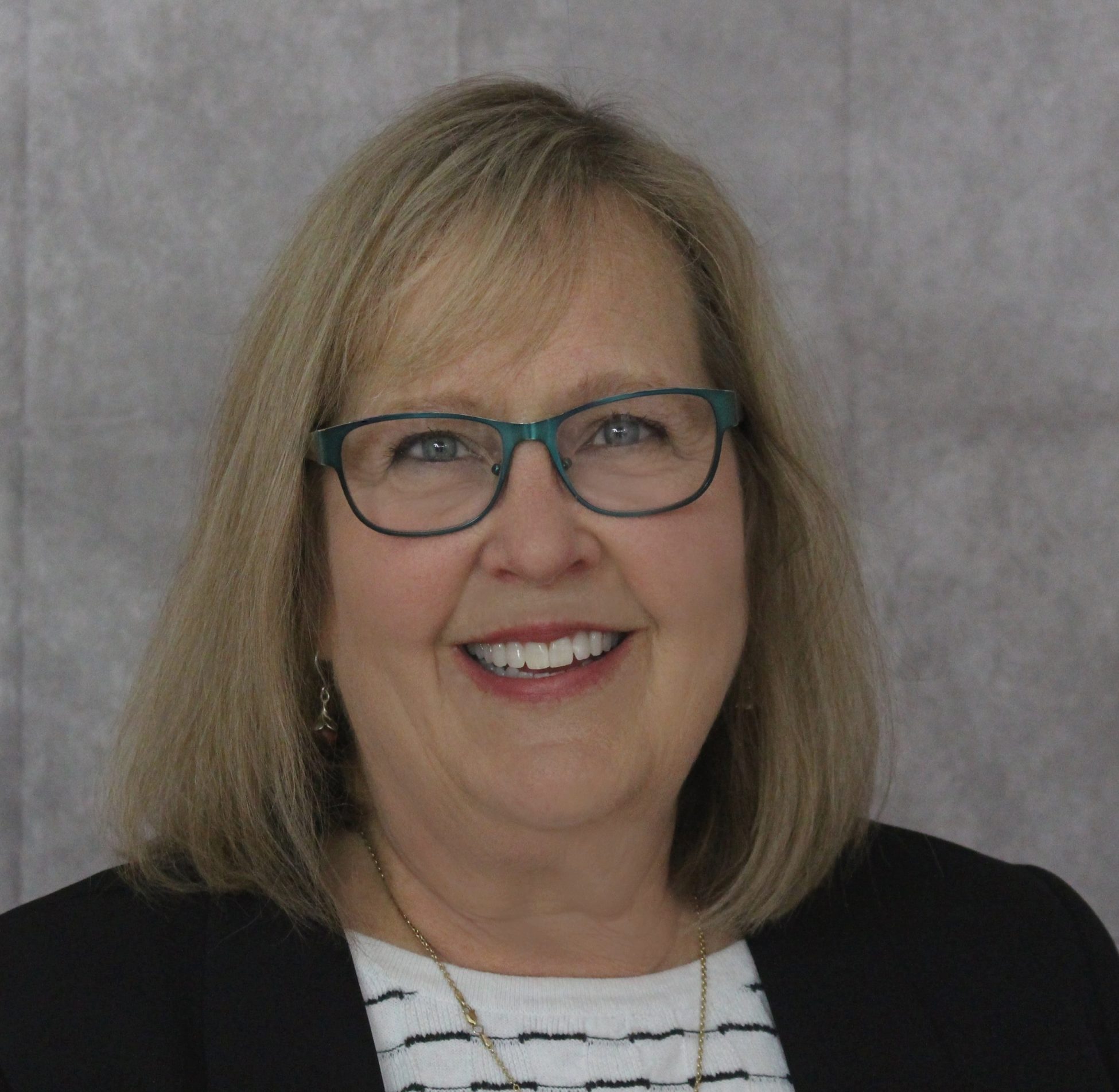
Sister Anne Francioni | Diocese of Springfield-Cape Girardeau, Missouri
Her ministry with at-risk mothers in the Ozarks has substantially reduced infant mortality
We are all familiar with Jesus’ tender call in Matthew 19:14 to “Let the children come to me, for it is to just such as these that the Kingdom of God belongs.”
We often romanticize our picture of these children. We imagine them smiling, well-fed and joyful. But just as likely, these little ones were hungry, neglected and worn-down. These would be the children Jesus most wanted to gather. And these are just the children that Sister Anne Francioni serves in southeastern Missouri.
Sister Anne began Whole Kids Outreach (WKO) in 1999. WKO serves 11 counties in southeastern Missouri, covering 8,080 square miles. In WKO’s program participants, the average household income for a family of four is 47% lower than the state of Missouri’s average.
-
Read more
WKO’s families experience higher than state averages for food insecurity, substantiated child abuse, inadequate prenatal care, teenage pregnancy, infant mortality rates and preventable child hospitalization.
WKO’s singular mission is to empower families through programs in their homes, at the three WKO campuses and in community outreach service. WKO focuses their collaborative efforts on the unmet health and developmental needs of children, youth and pregnant women and teens.
WKO’s results are stunning.
Families may have a history of abuse and neglect when they begin services with WKO, at a rate which averages a heartbreaking 50 out of every 1,000 children. Of the children enrolled with WKO, the incidents of repeat, substantiated abuse and neglect decreased to 10 out of 1,000.
In recent stats, 98% of pregnant program participants received adequate prenatal care, and 94% delivered after 37 weeks. Ninety-five percent of the children reached 12 months of age without being hospitalized for a preventable cause, and 95% did not experience a substantiated child abuse/neglect incident while enrolled in WKO’s programs.
Ninety-five percent of participating parents demonstrated improved knowledge about child development and were able to access community support, which is known to decrease the risk of child maltreatment and improve adult outcomes. One hundred percent of the parents served in WKO’s home-visiting programs were able to identify and access at least one community resource beyond WKO that addressed their specific family needs.
Of course, Sister Anne does not do this alone. Twenty-seven full-time and 20 seasonal employees have joined her in this beautiful mission. Now in its 26th year, WKO has served over 20,000 families.
And it is the relationships that drive WKO’s success.
Families experience genuine concern from the staff and are offered tangible support when needed. It is the power of those relationships that fosters families’ knowledge and skills to achieve substantial improvement in their well-being.
Many of WKO’s staff know these challenges firsthand, and so with empathy, expertise, compassion and encouragement, they teach and mentor families. In one WKO mother’s words, “They provide tools for parents and teach them how to use these tools.”
Sister Anne is a powerful witness to the Catholic Church’s social justice teaching. She is fond of saying, “Dream with me and don’t let anyone tell you that you can’t save the world. Just get up every morning and work at it, and then do it again the next day and the next and the next.”
And this is why the hungry, neglected and worn-down children (and their families) come to Sister Anne and WKO’s doors. It is to just such as these that the Kingdom of God belongs.
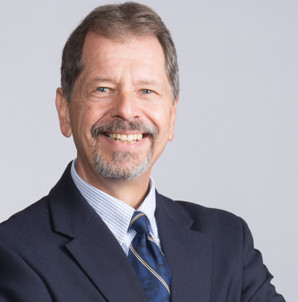
Dick Russ Hlabse | Ukrainian Catholic Eparchy of Saint Josaphat in Parma, Ohio
Meet the man behind ‘The Rock’: Broadcasting faith to 2.4 million listeners
When most Catholics hear the term “the rock,” we think of St. Peter and Christ’s powerful commission, “You are Peter, and upon this rock, I will build my church.”
But not in the Ukrainian Catholic Eparchy of Parma, Ohio. There, when they hear the term, Catholics think of their Catholic radio station, AM 1260, also known as “The Rock,” which is available to an astounding 2.4 million souls every day.
The creator of this powerful network is Dick Russ Hlabse. Hlabse has been active in the broadcast journalism business for 54 years, most of that time spent in mainstream media. He worked for many major networks in the Cleveland area: ABC, CBS, NBC, PBS and FOX. He is best known for his work as an anchorman at two television stations in Cleveland.
-
Read more
Fifteen years ago, Hlabse created (and continues to produce to this day) a TV show on EWTN: “Living Right with Dr. Ray.” The show, which combines Catholic values with psychology, reaches hundreds of millions of viewers.
He then left his career in mainstream media to dedicate himself full-time to Catholic media. He started a Catholic radio station in Ohio, AM 1260 (“The Rock”), and he is in the process of acquiring more stations to reach more people.
Hlabse and his wife, Christine, attend the local Ukrainian Catholic parish. Their three grown sons are deeply involved in their faith. His oldest son, Father Andrij Hlabse, SJ, is finishing his Ph.D. at Notre Dame, while his other two sons have advanced degrees in theology and philosophy and one works for Notre Dame’s Department for Ethics and Culture.
Hlabse and his wife started LifeWorks Ohio, a nonprofit organization which promotes the Catholic Church’s teaching on pro-life values, from conception to natural death. This ministry reaches thousands of people throughout the state of Ohio.
Hlabse said, “All of this work is for the greater glory of God—AMDG, Ad Majorem Dei Gloriam. We are all called in some way to be fishers of men, whether you are clergy, religious, lay person, no matter what your state of life.” He feels the Holy Spirit has been guiding him throughout his career and apostolate.
When it comes to the media, Hlabse has done it all. And all of his efforts have had one goal: building up the Body of Christ. St. Peter would approve.
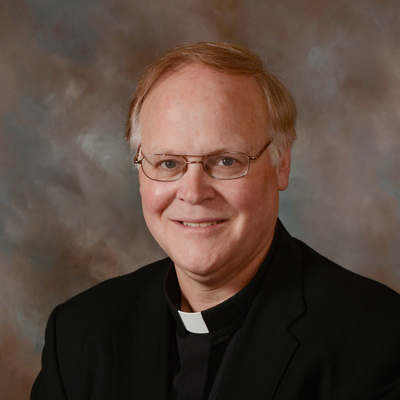
Father David Cornett | Diocese of Steubenville, Ohio
This priest has spent a lifetime ending isolation for the deaf
At the age of 19, while in seminary, Father David J. Cornett began learning American Sign Language. Now, after nearly four decades as a priest fluent in sign, his work has provided a vital ministry for the deaf community.
He served his first 20 years of priesthood as a Divine Word Missionary—and his work with deaf communities touched lives across Iowa; Washington, D.C.; West Virginia; Chicago; and the Democratic Republic of the Congo. During his time in the Congo, he led a deaf center serving 300 people.
Now serving as a priest for the Diocese of Steubenville, Ohio, Father Cornett is the only priest in the tristate area (Ohio, West Virginia, and Pennsylvania) who celebrates Mass in American Sign Language. However, his ministry takes him far beyond the walls of the two parishes he pastors, Assumption of the Blessed Virgin Mary Parish in Barnesville, Ohio, and St. Mary’s Parish in Temperanceville, Ohio. He is an on-call interpreter at area hospitals, where his presence provides not only enhanced communication, but spiritual support to those facing illness and critical challenges. He is also heavily involved in the Wheeling Deaf Club, building community and friendship among the local deaf population. His compassion has made him both a beloved and trusted figure.
-
Read more
From the moment he began learning sign language in seminary, Father Cornett recognized the isolation that many deaf Catholics experience. His greatest reward is seeing how this ministry makes the deaf feel included in the life of the Church as active participants in the Mass and through the sacraments. This is a source of joy and fulfillment for him.
In addition to his incredible work with the deaf community, Father Cornett is heavily involved with the Barnesville Area Food Pantry and Thrift Store. The pantry provides weekly distributions, emergency assistance and a summer lunch program feeding up to 300 children daily.
What makes Father Cornett’s ministries so impactful are not just the outreach and services he provides, but the compassion and respect with which he serves. His ministry reminds the community—especially those who are often forgotten—that they are part of the Church and that they belong. His deep humility, unwavering kindness and tireless dedication have made him a beloved pastor.
Whether he is interpreting for a deaf patient at the hospital, offering a blessing in sign language or handing out food at the pantry, he sees the face of Christ in everyone he meets.

Superior District Council of the Society of St. Vincent De Paul | Diocese of Superior, Wisconsin
Their service to the less fortunate across northern Wisconsin is spiritually transformative
The Society of St. Vincent de Paul has long been a source of hope for those in need. It is a ministry of profound compassion, anchored in the corporal and spiritual works of mercy. This is on full display in northwest Wisconsin. The Superior District Council of the Society of St. Vincent de Paul has 87 members and over 140 more volunteers, all of whom joined forces to touch the lives of over 5,000 people in the last year.
This ministry is well organized and spread out to make sure that each area of the diocese is attended to. The Superior Sacred Heart of Jesus Conference operates a free store for people to acquire food and clothing. The Rice Lake St. Joseph Conference has a thriving thrift store that funds a food pantry, meal program and home visit outreach. The Phillips St. Therese of Lisieux Conference offers opportunities to develop work skills for school-age students. And the Merrill St. Francis Xavier Conference’s main efforts are focused on providing financial assistance and shelter to those in need.
As a Catholic lay ministry, this society is more than an organization. It’s a sanctuary for spiritual growth and solidarity with the common goal of helping the less fortunate. These are compassionate people that see the face of Christ in those they serve and show empathy and generosity toward those grappling with life’s hardships.
-
Read more
“The volunteers of the Society of St. Vincent de Paul are beacons of hope, bringing light to those facing hardship and despair,” Diocese of Superior Bishop James Powers said. “They offer comfort to the grieving, nourishment to the hungry, shelter to the homeless and encouragement to the marginalized—all motivated by boundless love and unwavering faith.”
Four conferences, several lives touched. In the past year, the Superior District Council of the Society of St. Vincent de Paul conducted nearly 500 direct home visits and over 2,000 community visits.
However, this impact goes much further than the numbers. As Father Andrew Ricci, a priest in the Diocese of Superior, pointed out, it’s about the genuine care they show to each individual.
“People are treated with respect and dignity as their stories are heard and the response is tailored to their unique situation,” Father Ricci said. “No one is treated like a number; rather, they encounter direct assistance for housing, transportation, medication, food, clothing and the fundamental conviction that they are children of God.”
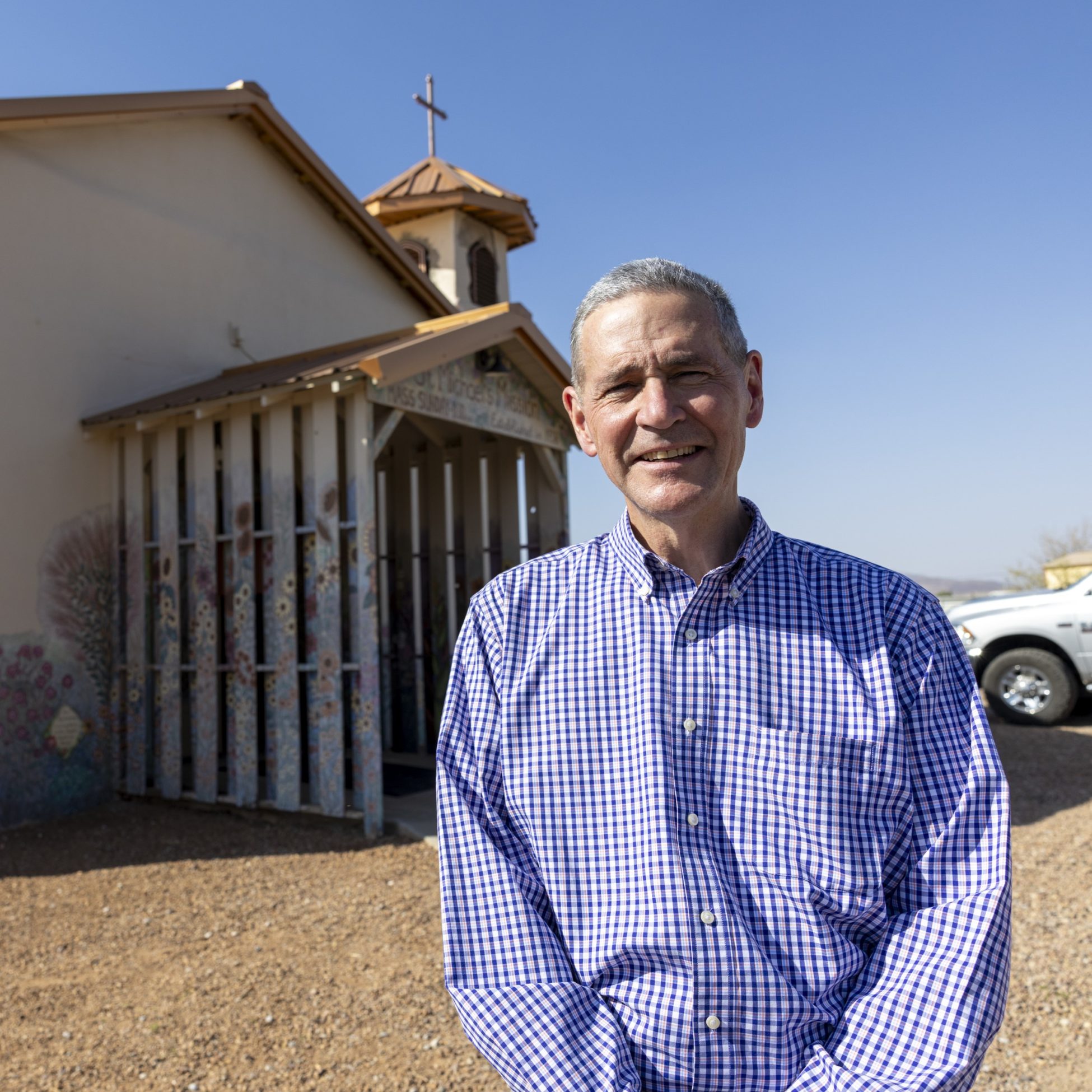
Deacon Tony Underwood | Diocese of Tucson, Arizona
He insists the church doors must always be open
Deacon Tony Underwood is very proud of the fact that the doors to St. Patrick Church remain open every day from 5:30 a.m. to 4 p.m. There are lots of reasons to keep them locked—preventing vandalism, thwarting theft, keeping the church clean and orderly.
But in Deacon Underwood’s way of thinking there is only one reason to keep the doors unlocked. If God’s heart is always open to us, shouldn’t God’s church be open too? And St. Patrick Church’s location in downtown Bisbee, Arizona (population 5,000), creates an even more compelling reason: It is across the street from the Bisbee County Courthouse and jail.
The courthouse has a long line of worried families flowing in and out. The quiet of St. Patrick’s is the perfect place for their intercessions. Of course, the doors should stay open. Deacon Underwood is known to visit the church armed with stuffed animals and toy dolls for the anxious children who kneel next to their moms. As a father of three and grandfather of five, he is aware and attuned to these things.
-
Read more
Before becoming a deacon, Underwood worked in the aerospace industry for 23 years designing missile defense systems. The prophet Isaiah talks about a time when we will beat our swords into plowshares and our spears into pruning hooks. Underwood jokes that he turned bombs into blessings.
He was ordained a deacon in 2003 and assigned to St. Patrick Parish as its full-time administrator in a small town and church with no resident pastor. In addition to serving St. Patrick’s, he serves at St. Michael Mission in Naco, Arizona. He led the restoration of both churches during his tenure.
Perhaps most impressive about his work is the committed team of volunteers he leads, who help extend the church’s presence to this community of economic need and often of hunger. These ministries include a women’s club, the St. Vincent de Paul Society which serves meals, and the parish’s detention ministry.
Deacon Underwood visits the Cochise County Jail twice a month. The faith of the prisoners moves him deeply. He said the inmates’ intercessions at the Prayers of the Faithful are some of the purest prayers he has ever heard. He always “floats out of there,” deeply touched by the faith of these men whose tears move him to tears.
The team at St. Patrick loves Deacon Underwood. He inspires them and models a style of ministry that is open to all. They attest that he has a way of finding and drawing out the gifts of everyone. His homilies are especially appreciated because they are grounded in hope.
He preaches that, “There are no hopeless situations. God is here with you. You are seen, known, loved and called to serve. Be confident and long for that future good that God will provide.”
And that is why, at the confluence of the courthouse and the church, St. Patrick’s doors are always open.
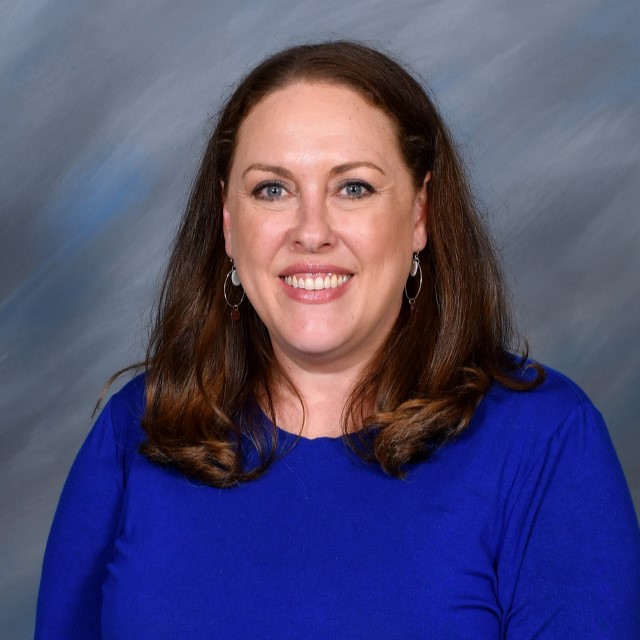
Christine Tyler | Diocese of Tulsa, Oklahoma
Tulsa’s underserved youth grow as confident, faith-filled learners thanks to lifelong educator
Christine Tyler is a model for setting a positive tone and loving your neighbor as yourself. As a history and social studies teacher at Bishop Kelley High School in Tulsa—coincidentally, named after Catholic Extension Society’s founder and the Diocese of Tulsa’s second bishop, Francis Clement Kelley—she sees each student through the eyes of God. She is highly regarded by her students for her unwavering mentorship well beyond the classroom.
But her passion doesn’t stop there—it shines in her work toward North Tulsa Learning Center’s mission to empower students and bridge the achievement gap among K-8 youth from north Tulsa’s underrepresented areas. Tutors and volunteers at NTLC are moved by Mark 12:31 in their work for young learners: “You shall love your neighbor as yourself.”
The center launched collaboratively in 2021 between leaders from two parishes—St. Monica and St. Augustine—and Bishop Kelley High School to provide free tutoring in reading and math.
-
Read more
Tyler has been instrumental in creating a more accessible program in the last few years. Since its inception, NTLC hosts monthly STEM, athletics and fine arts activities, which are also offered by Bishop Kelley High School. The program has grown from serving just four children to supporting an average of 15 per session, with nearly 100 Bishop Kelley students contributing over 500 hours of service annually—a testament to Tyler’s role in building bridges between the school and Tulsa neighborhood communities.
Her impact is also felt outside academics. She actively supports the faith by incorporating Catholic values into her teaching and playing piano at school Masses.
Bishop of Tulsa David A. Konderla commended Tyler’s tireless work: “She exhibits a passion for student success, a heart for learning and a mind for strategies, all which work towards extraordinary success for students.”
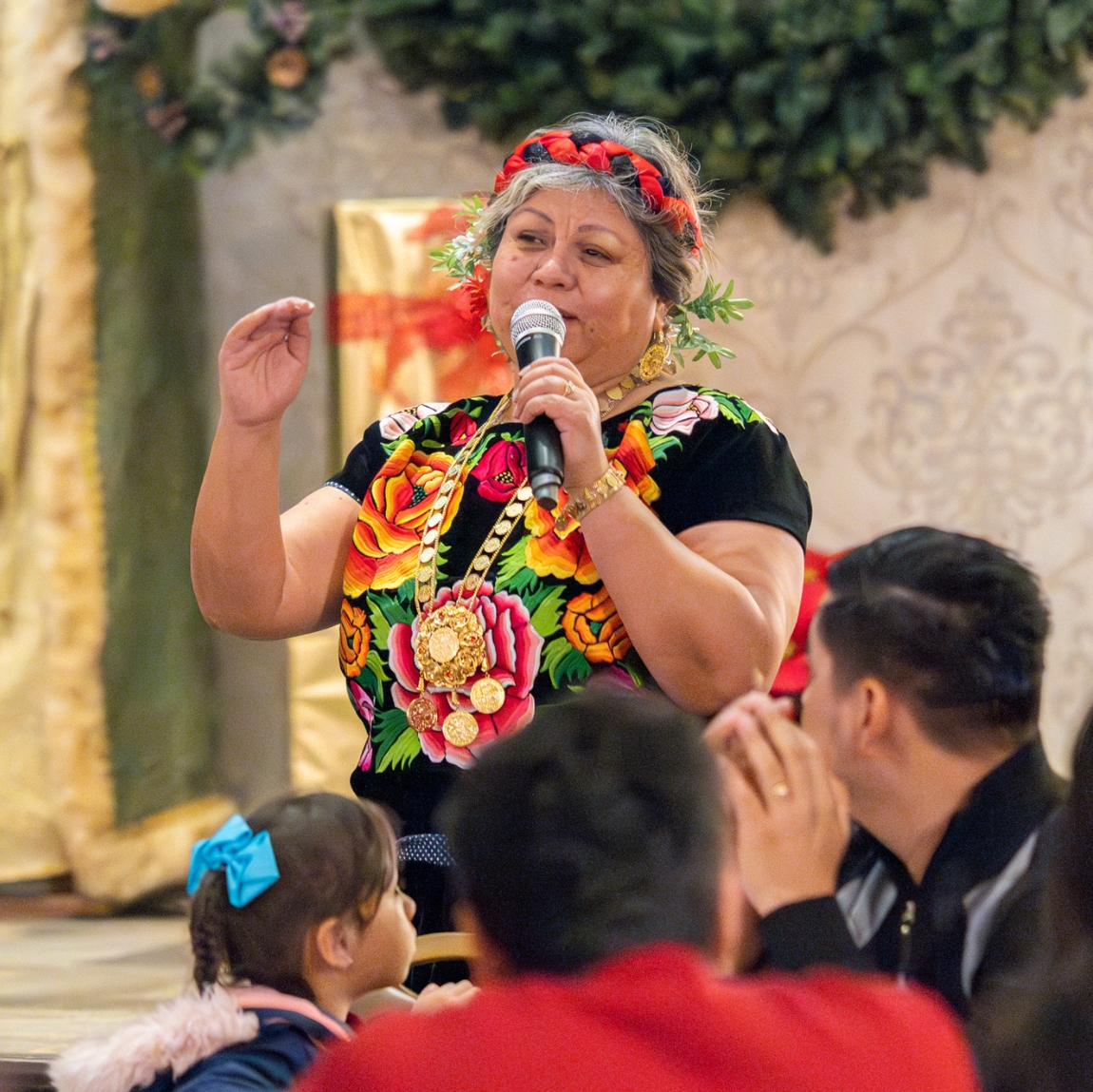
Cristina Hernandez | Diocese of Youngstown, Ohio
Her local church is growing thanks to her magnificent community-building skills among the marginalized
For 15 years, Cristina Hernandez has helped create a more welcoming, engaged and vibrant Church for Hispanic Catholic faith communities throughout the Diocese of Youngstown. In 2023, she was officially appointed the diocesan coordinator of Hispanic Ministry after many years of serving the Hispanic community as a volunteer and invested member of her parish.
Hernandez had made an impression on the newly installed Bishop David Bonnar in 2021 when she suggested that he include a Spanish-language reading during Mass. Since Hernandez began in her official role, the diocese has quickly expanded Spanish Masses and added more programs and cultural events for the Hispanic community.
Hernandez helps bridge cultural gaps by explaining the universal significance and beauty of Latin American Catholic traditions and celebrations while promoting unity and mutual respect. She helps everyone in the diocese appreciate and embrace the richness of Hispanic culture within the broader church community.
-
Read more
Under her leadership, the diocese has seen a significant increase in Hispanic Mass attendance and participation in parish life.
Last year, Hernandez organized the first annual diocesan-wide Las Posadas celebration, a religious festival popular in Mexico that commemorates the journey that Mary and Joseph took from Nazareth to Bethlehem. The festival begins on December 16 and lasts nine days, representing the time that Mary and Joseph searched for a safe place for Jesus’ birth. Hernandez also helps organize the December 12 Our Lady of Guadalupe celebration held at the cathedral, which last year saw hundreds of attendees, many of whom dressed in traditional indigenous clothing for the feast day.
Beyond large cultural events, Hernandez is also a personal, one-on-one presence—visiting homes, comforting the grieving, praying the rosary with families and helping individuals through emotional, spiritual and even financial hardships.
She helps people deepen their relationships with God and one another. One parishioner shared, “Although my family and I were new to the parish, she was always welcoming to us, and she had open arms for all.”
In addition to her master’s degree in social work, Hernandez has completed training programs and workshops in Catholic formation and Hispanic community rights from Boston College, Dayton College and other notable institutions.
Hernandez uses these skills to connect people with resources, translate for those in need and guide families through difficult times. Her efforts have been transformational.
“I have suffered for many years from depression, anxiety and a state of lacking faith in God,” said one community member. “She would come to my house, talk with me, bring me the rosary and speak to me of God and the love He has for me. Thanks to her and her advice, today I know that God loves me.”
“I have observed firsthand the dedication and transformative work that Cristina has been involved in over the years,” said Bishop Bonnar. “She has consistently demonstrated a deep and unwavering commitment to the mission of the Hispanic ministry in the Church, not only through her professional work but also through her personal witness of faith, hope and love. Her efforts have consistently reflected the values and teachings of Christ, making a profound impact on those she served.”
Cristina’s ministry has instilled a vibrant, inclusive environment that is welcoming more and more people to the Church in the Diocese of Youngstown. “We are here,” she said. “We are part of the community, and we want the Catholic faith to grow.”
We are proud to honor all of the Lumen Christi Award Nominees for 2025. Learn more about the award here.

